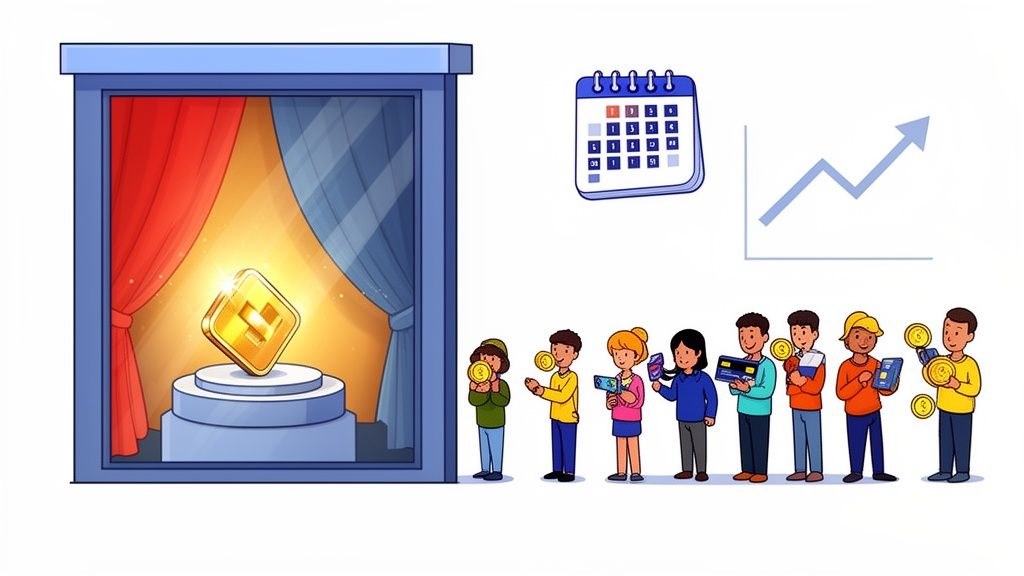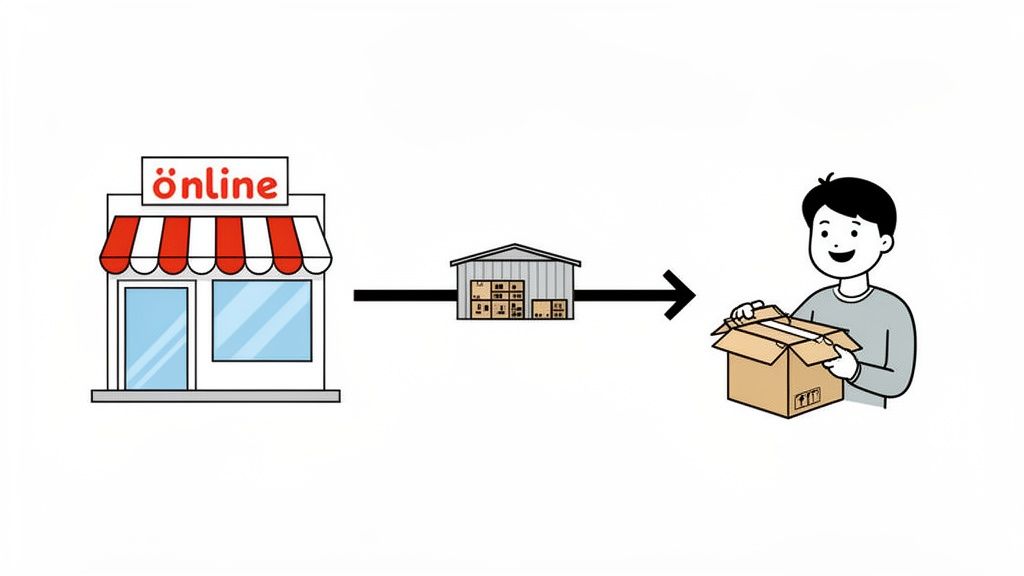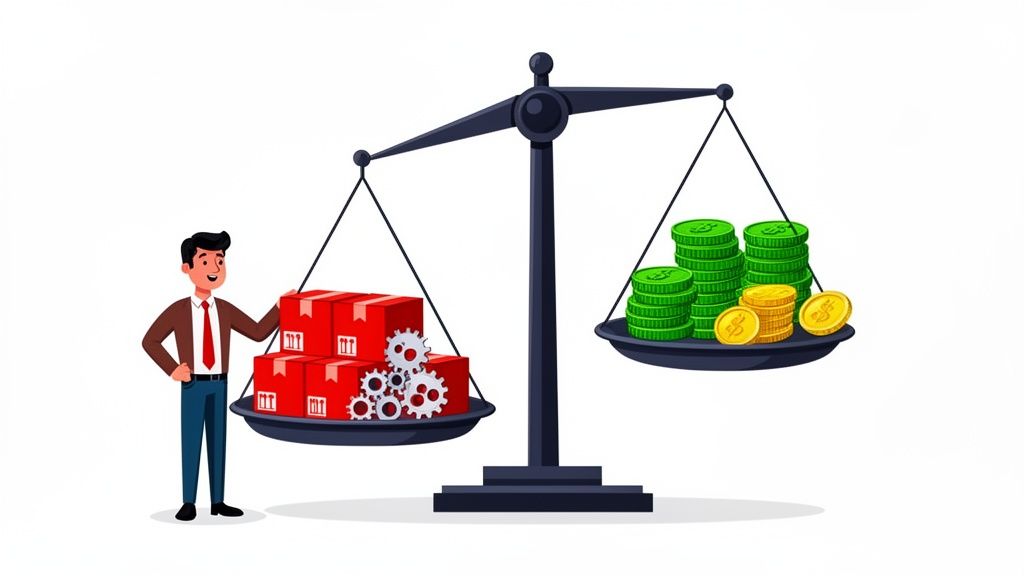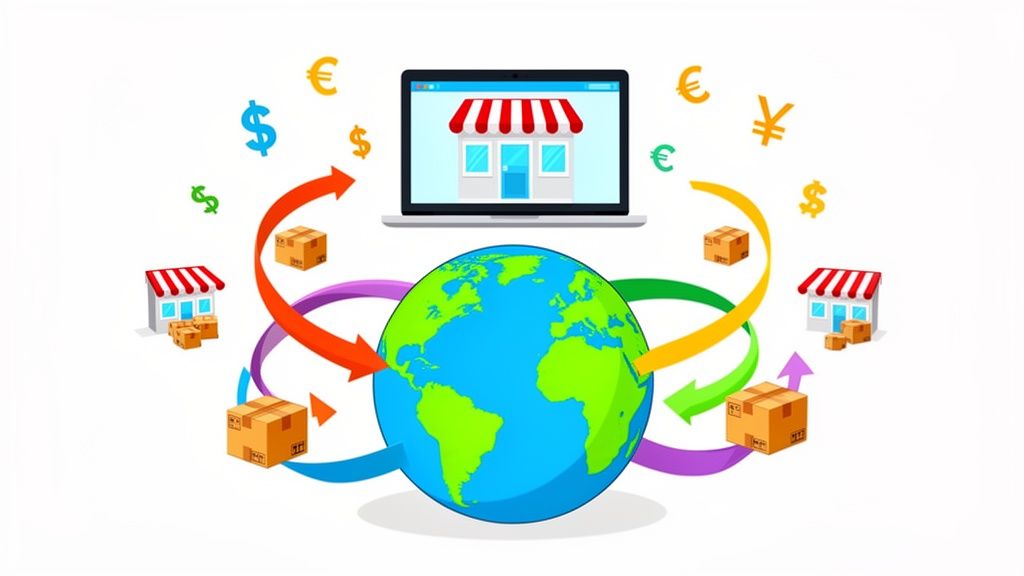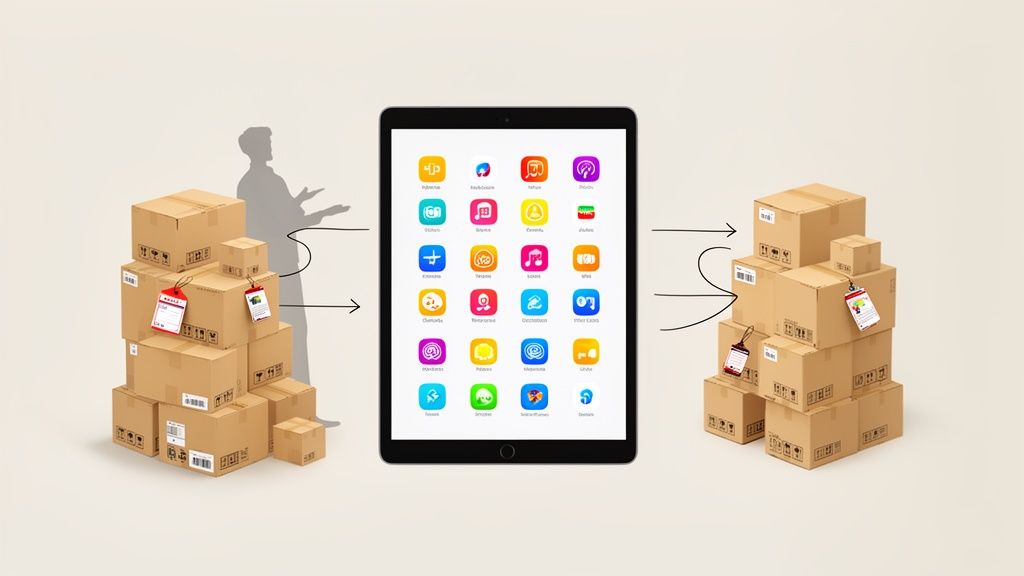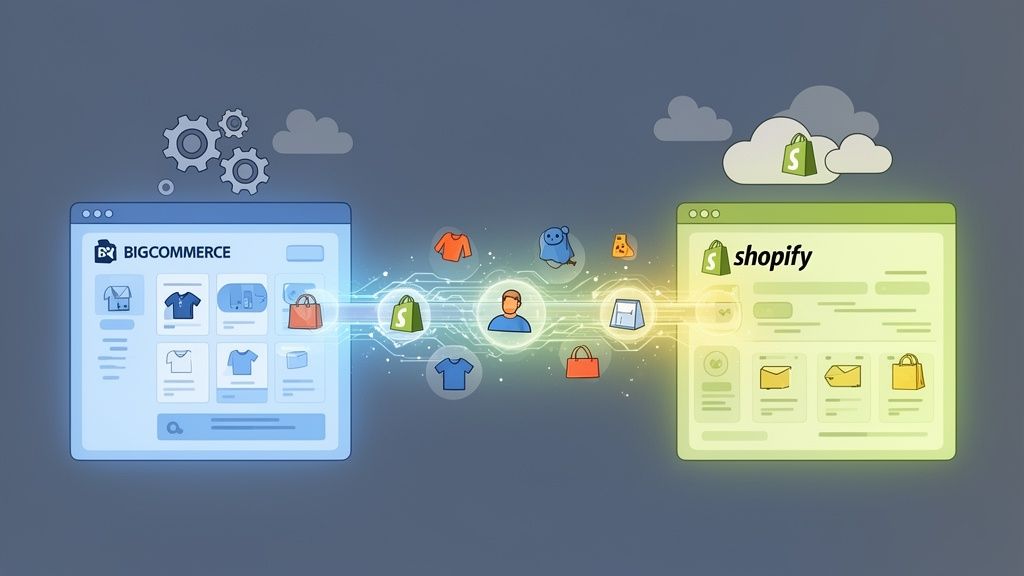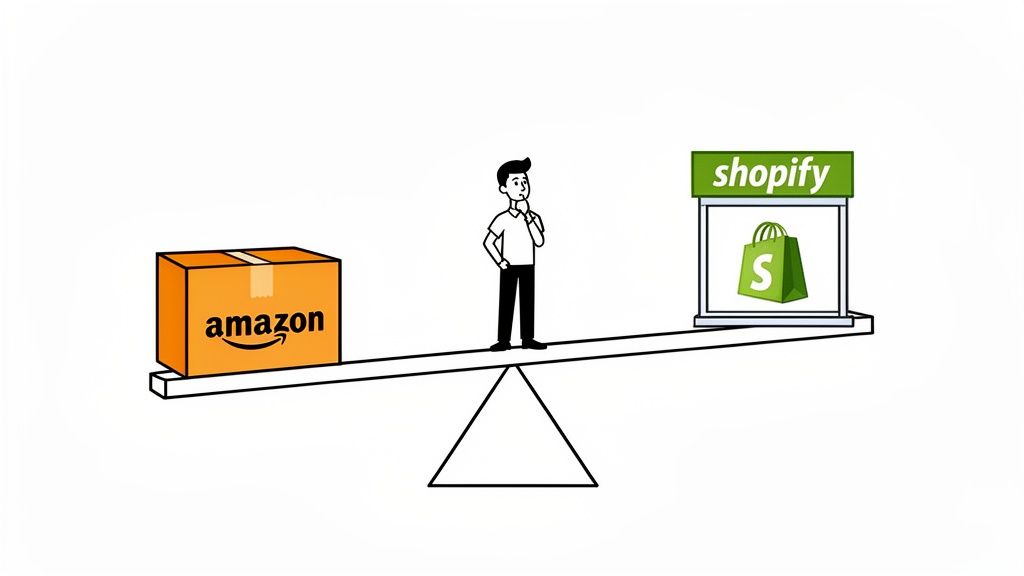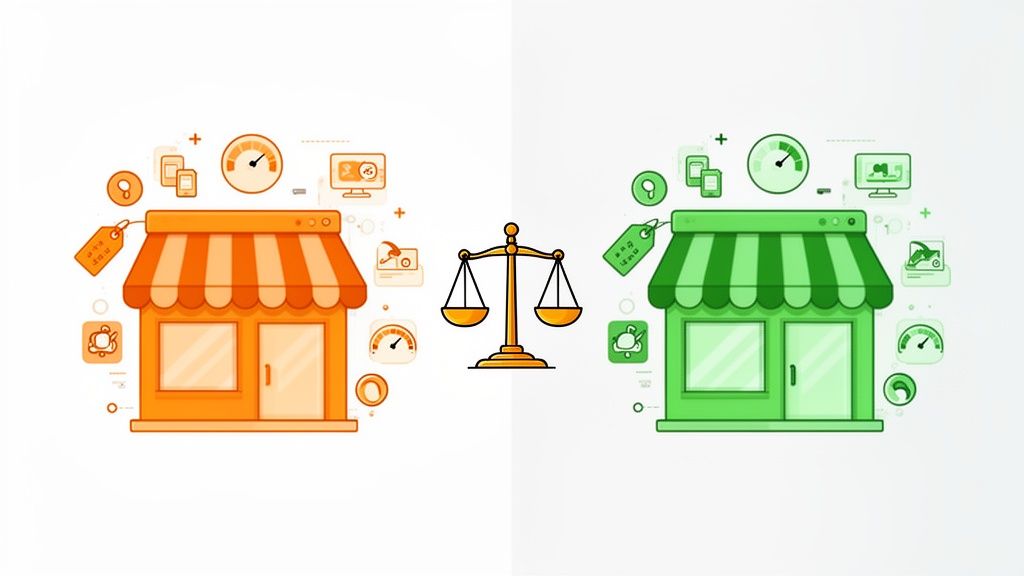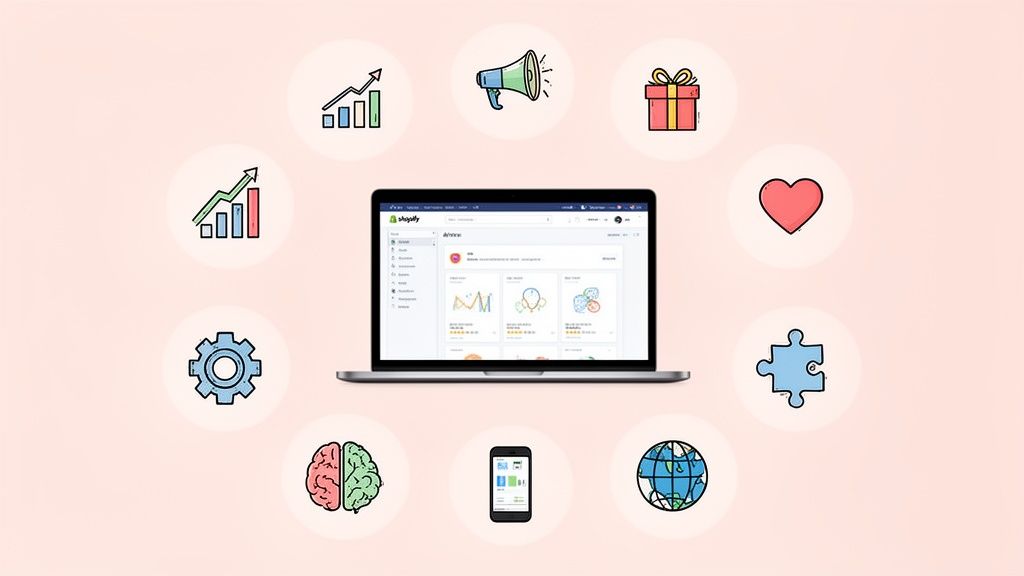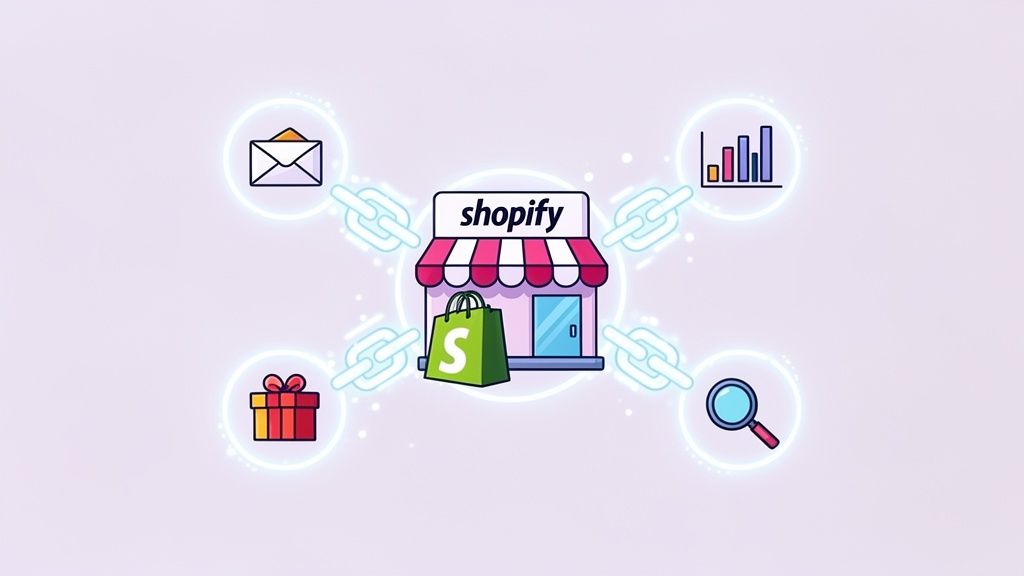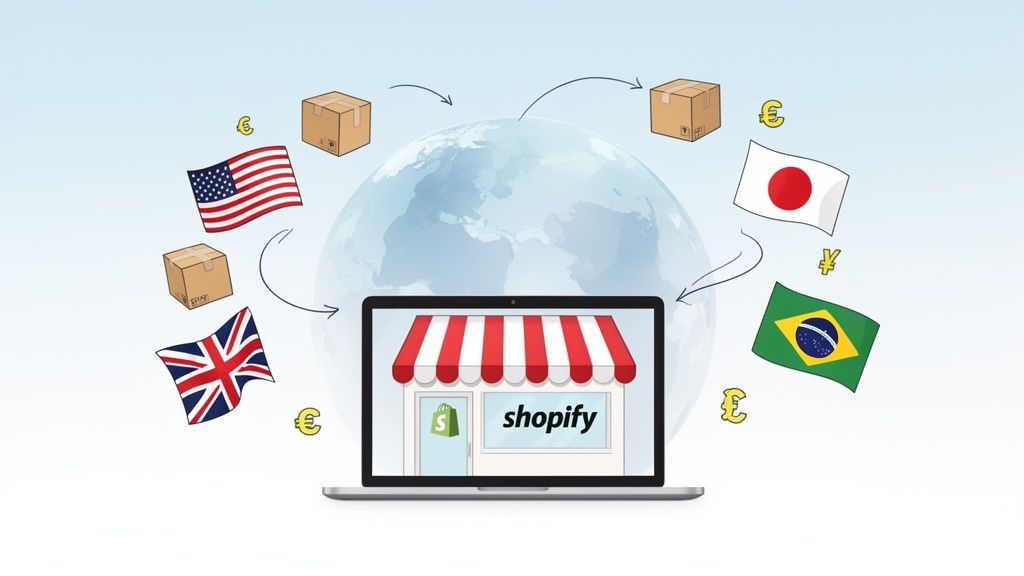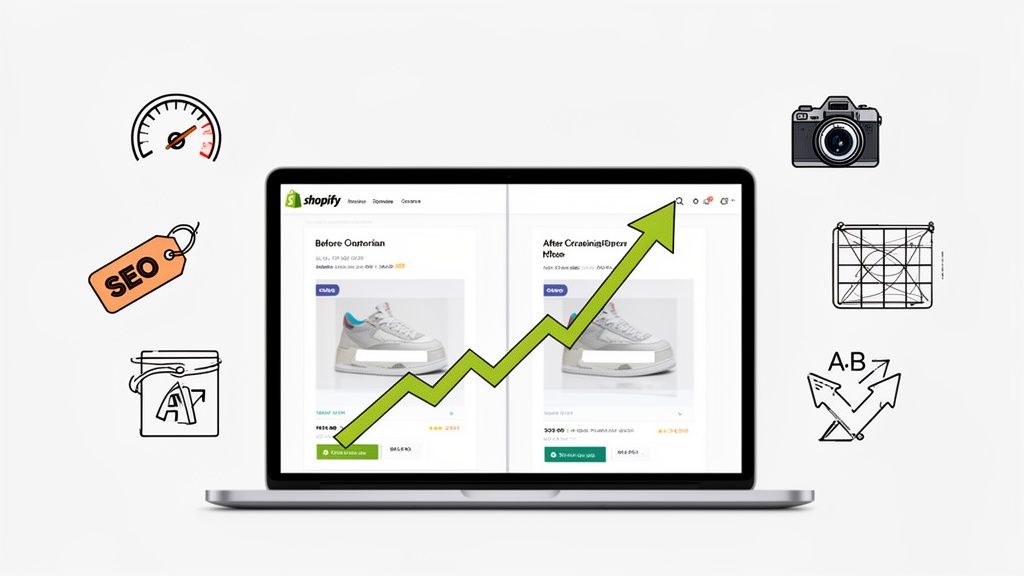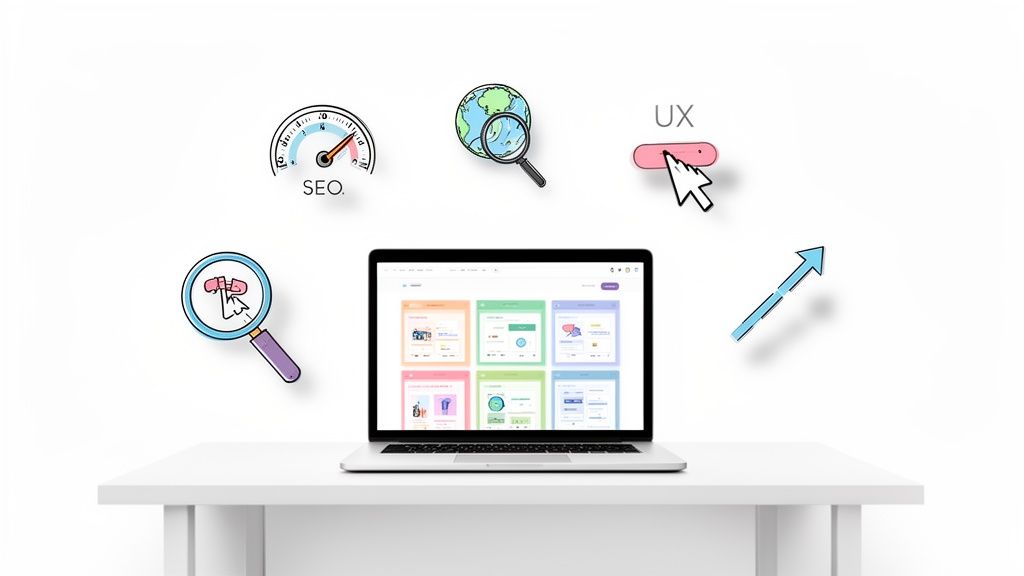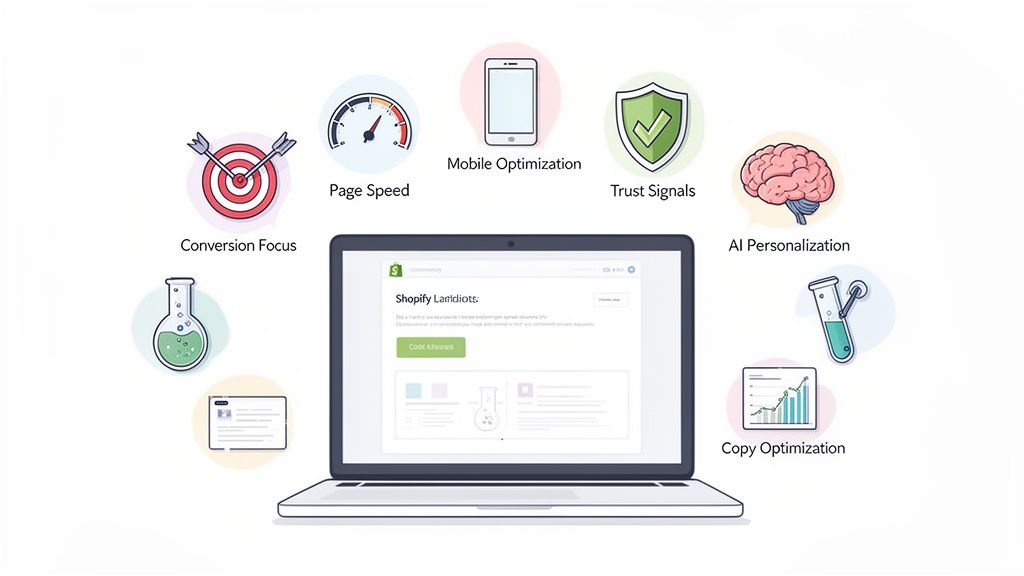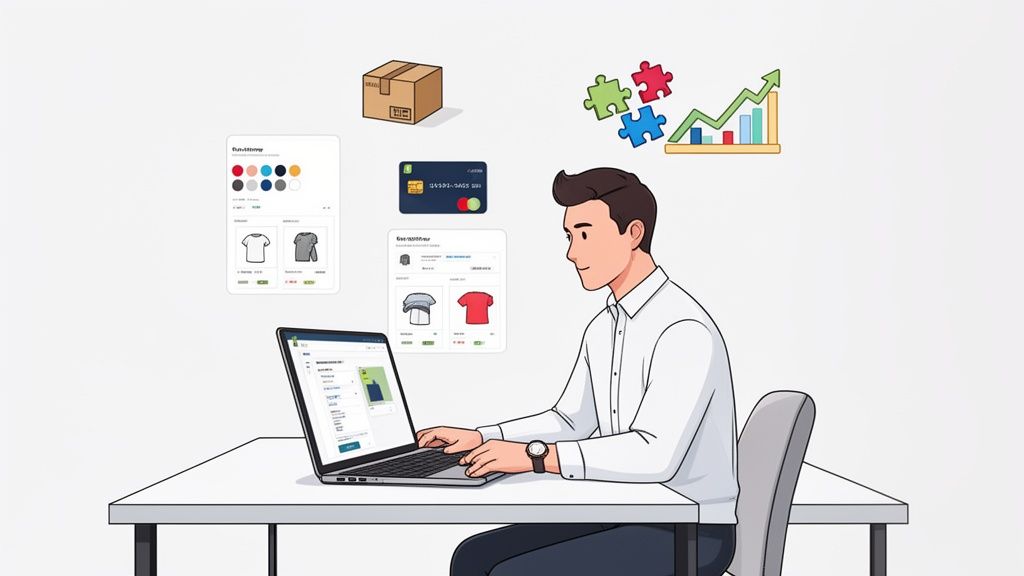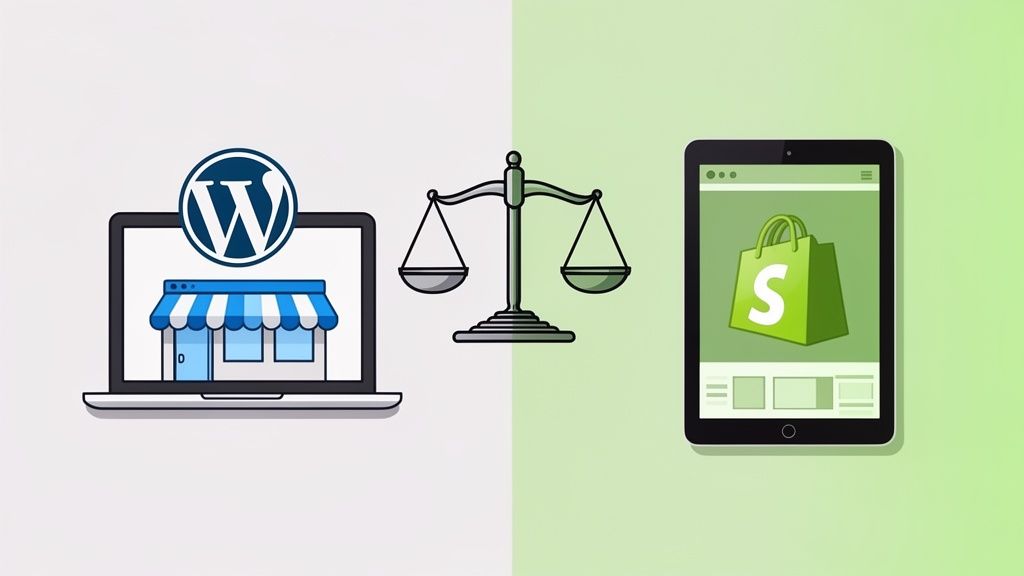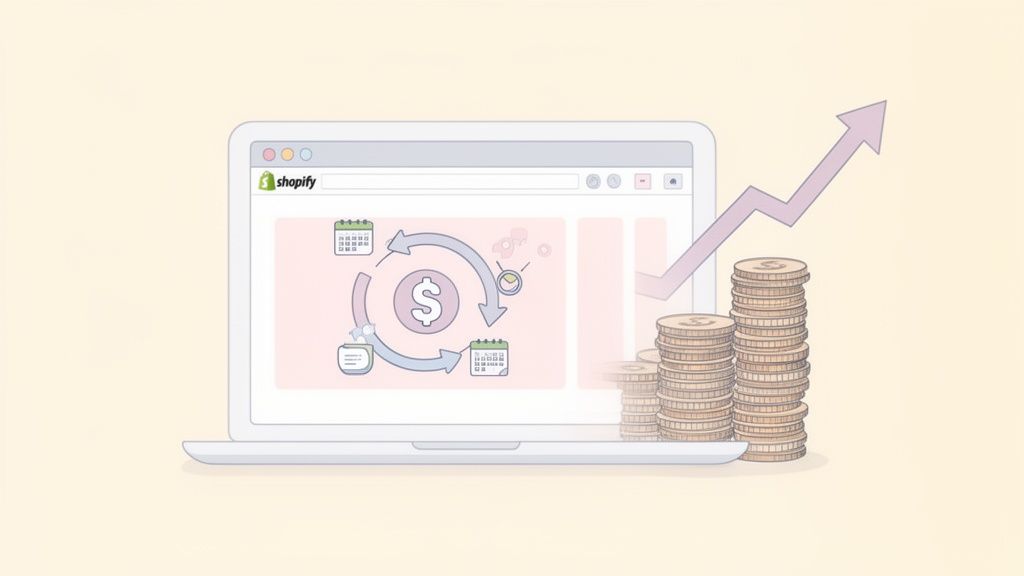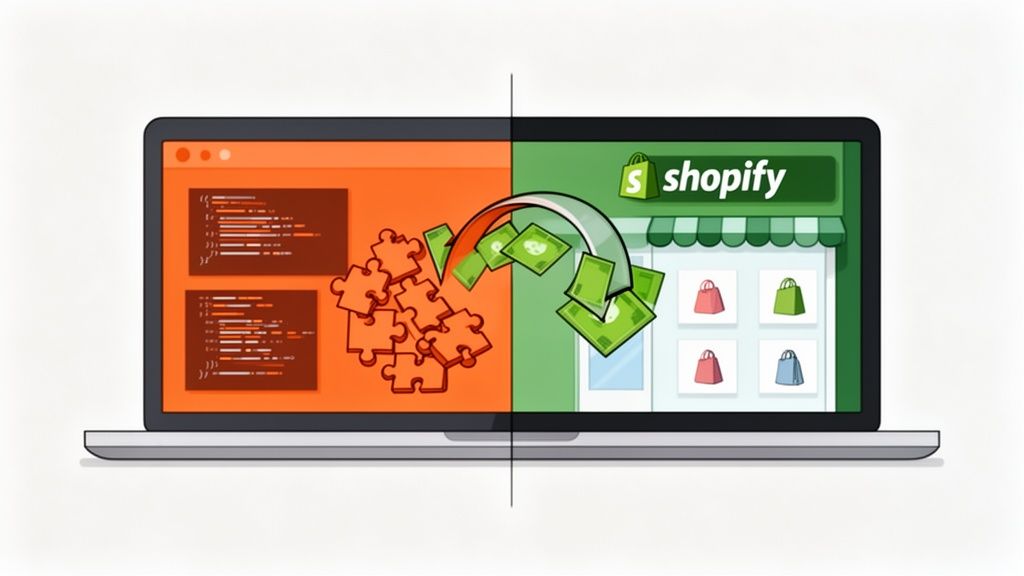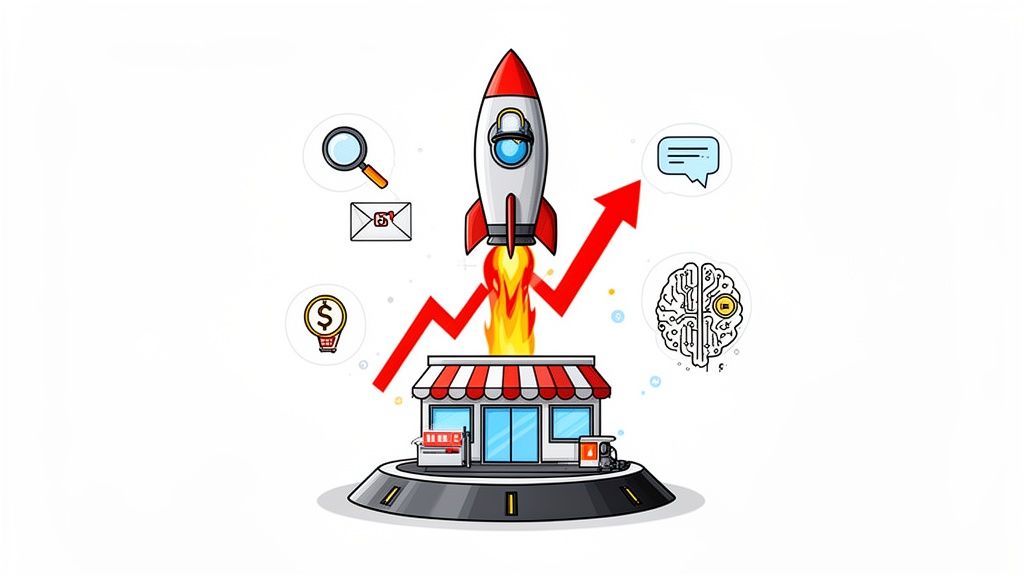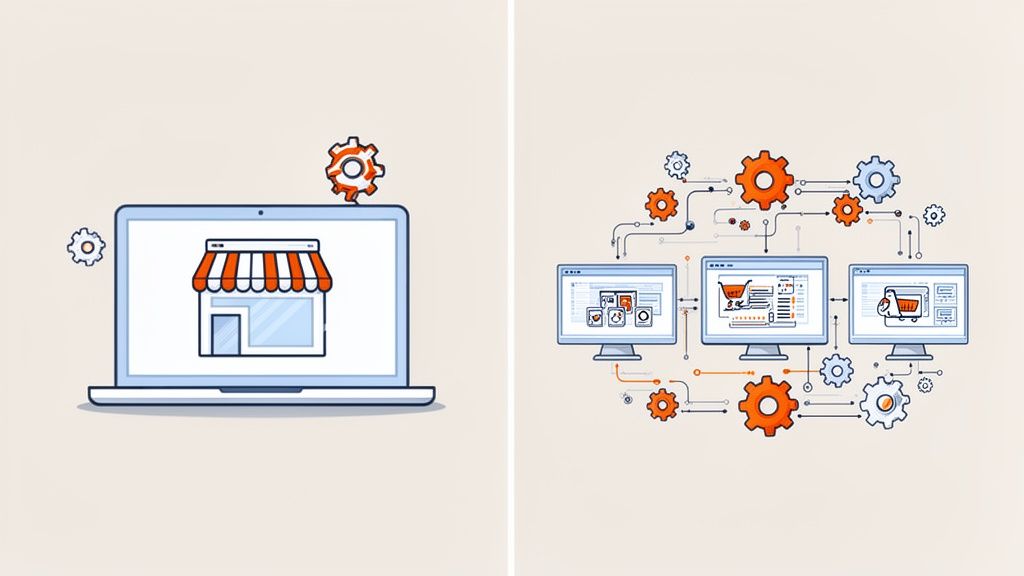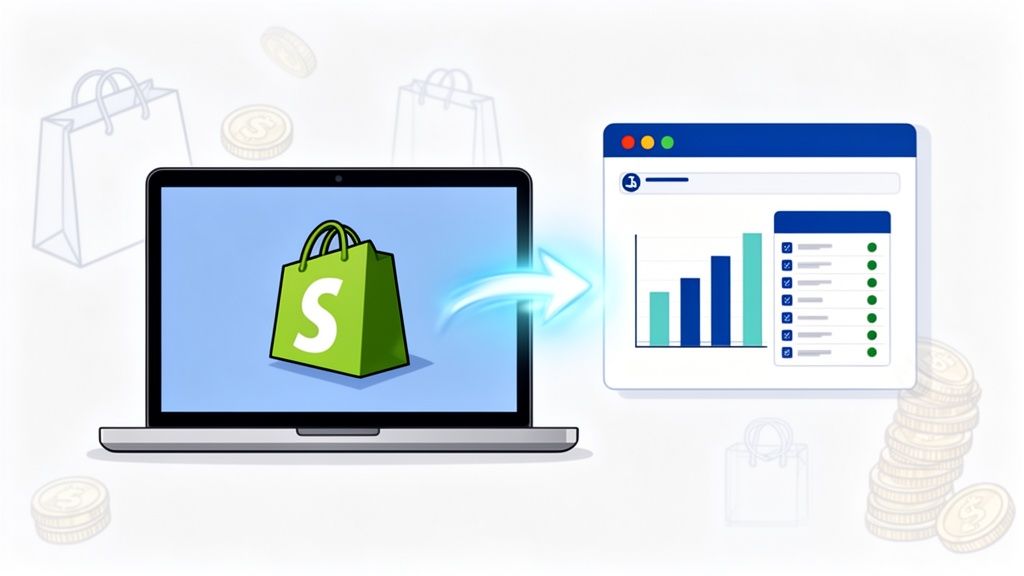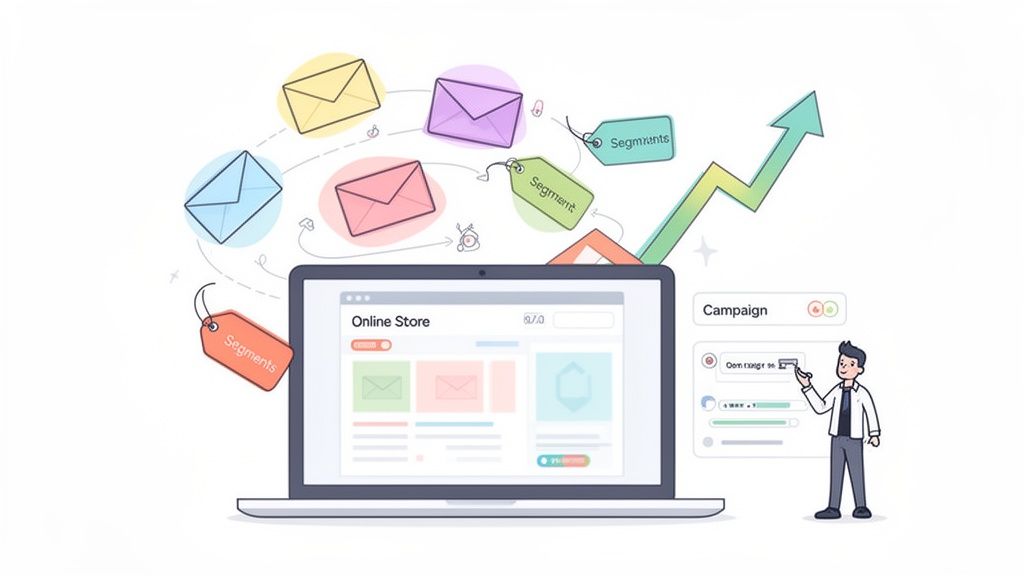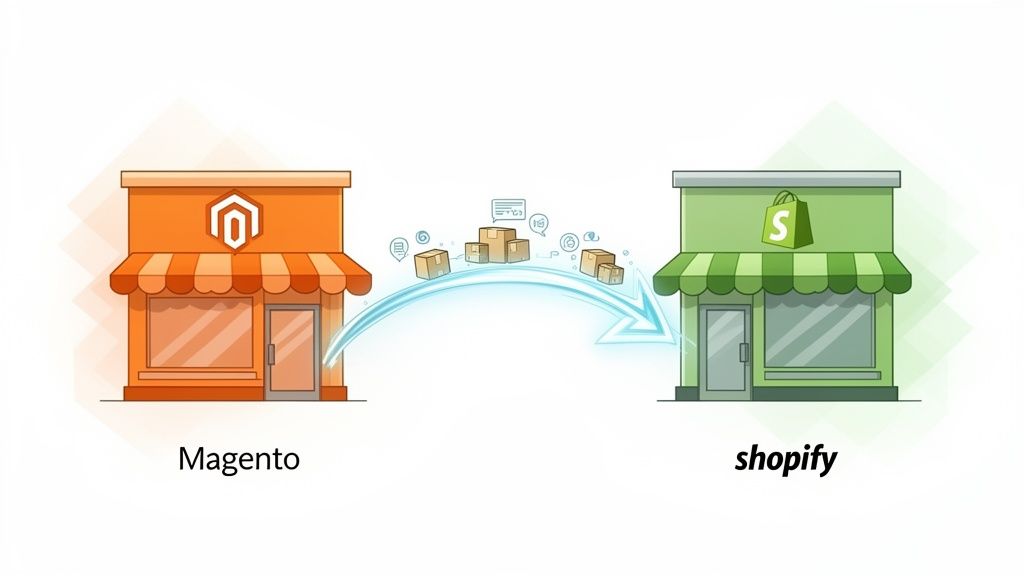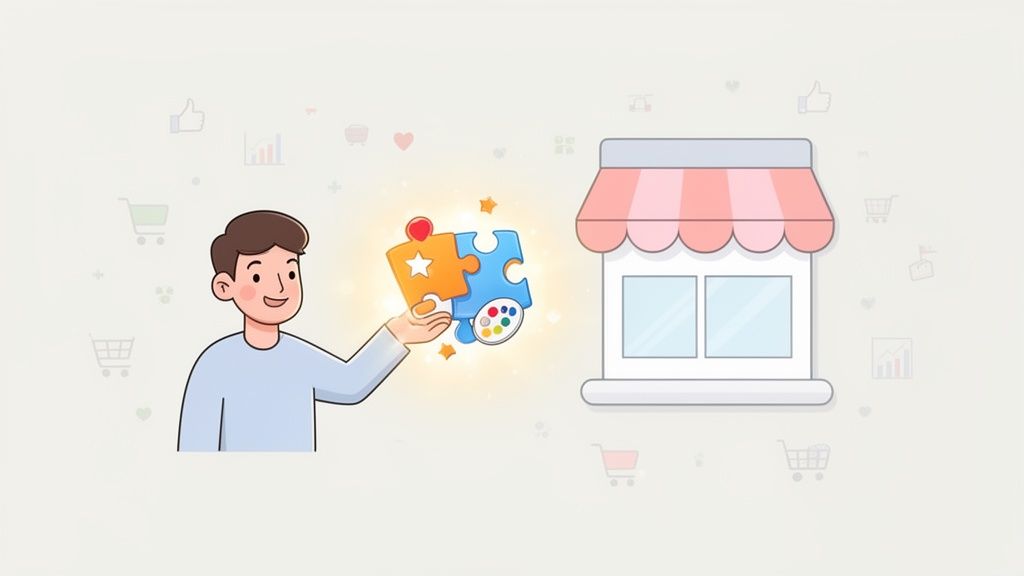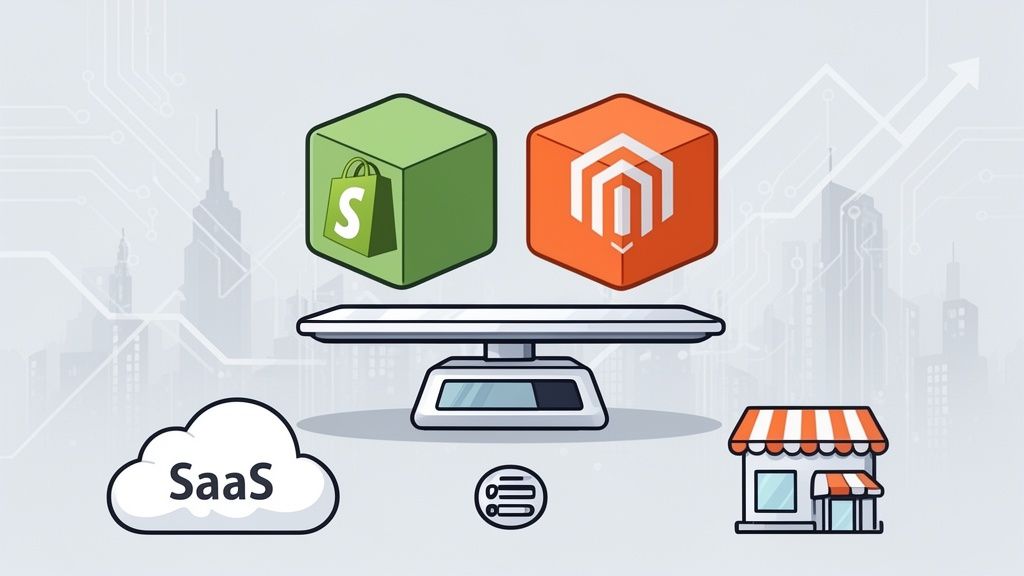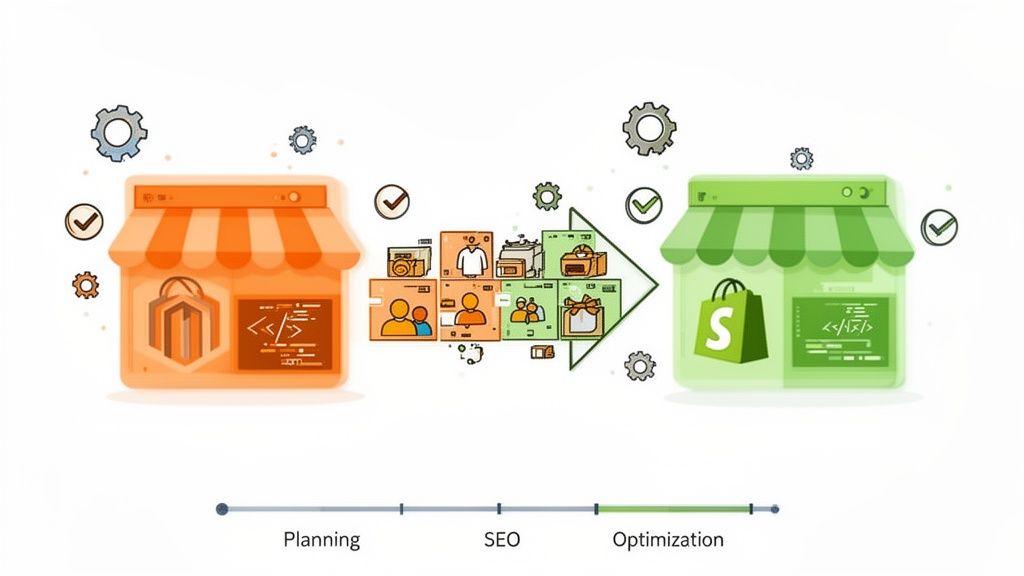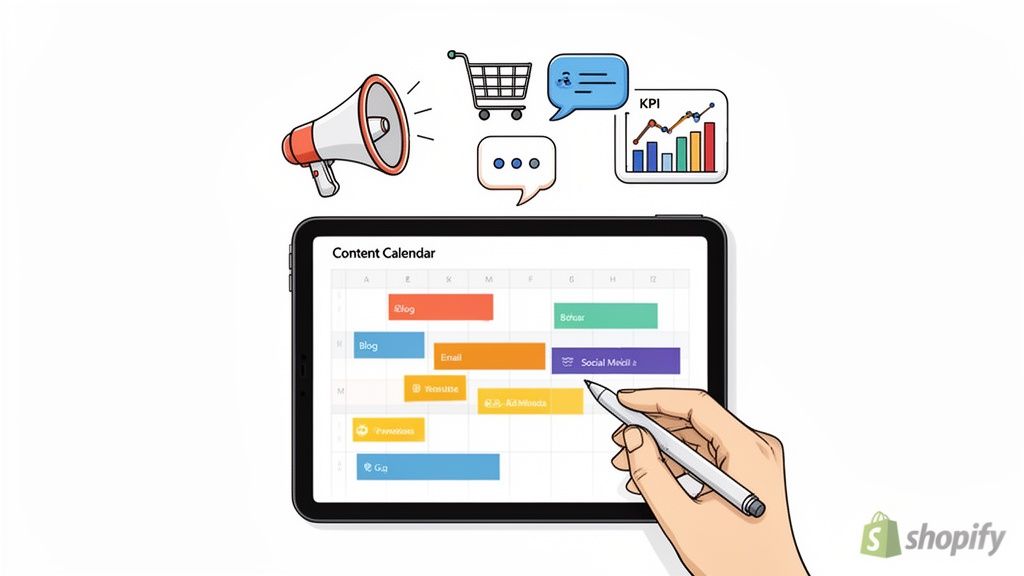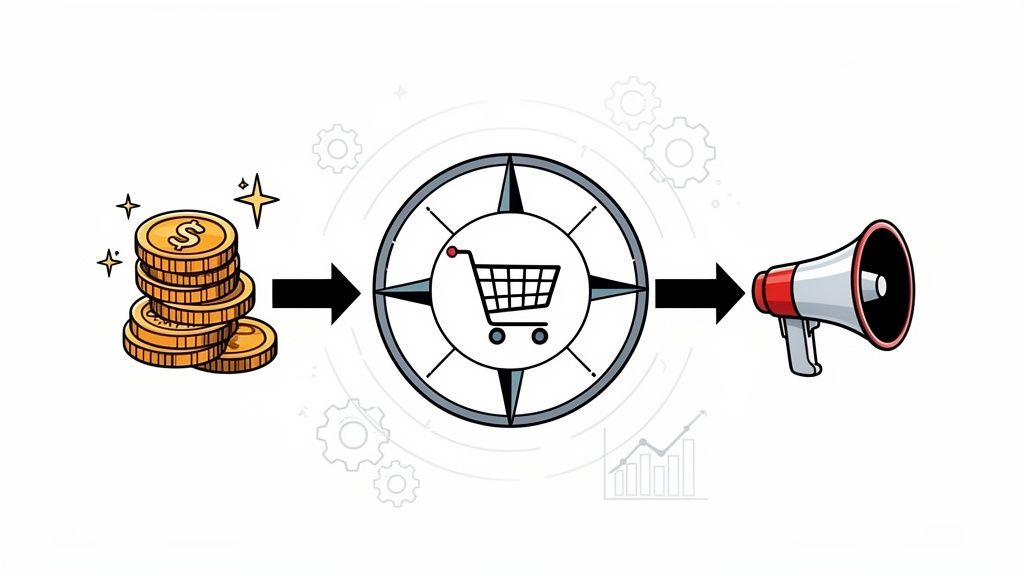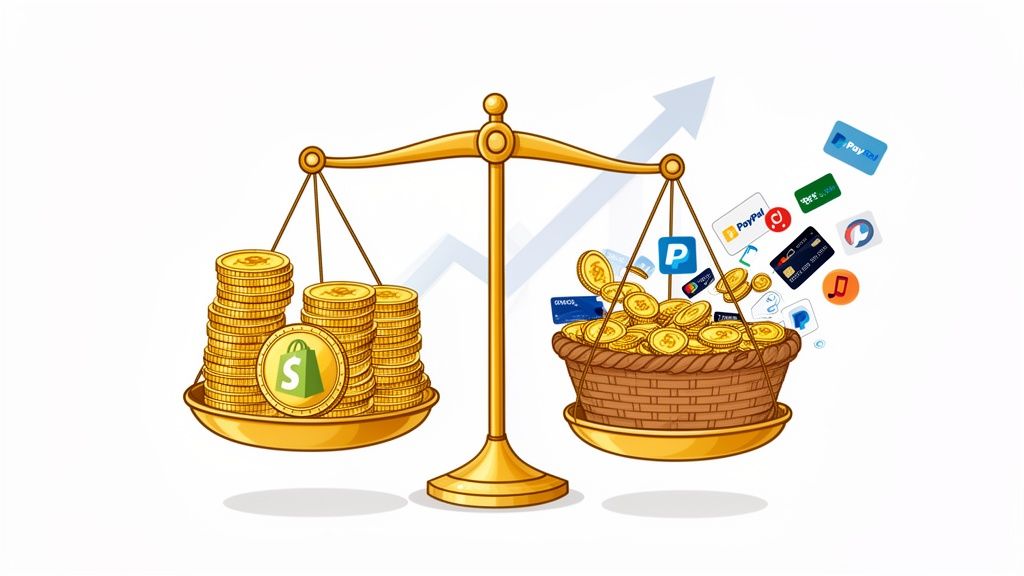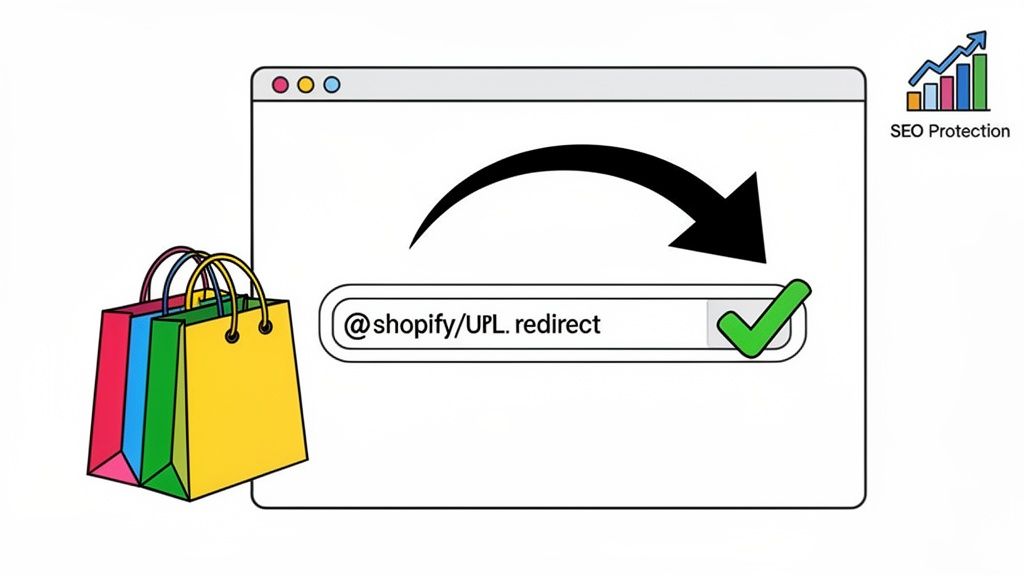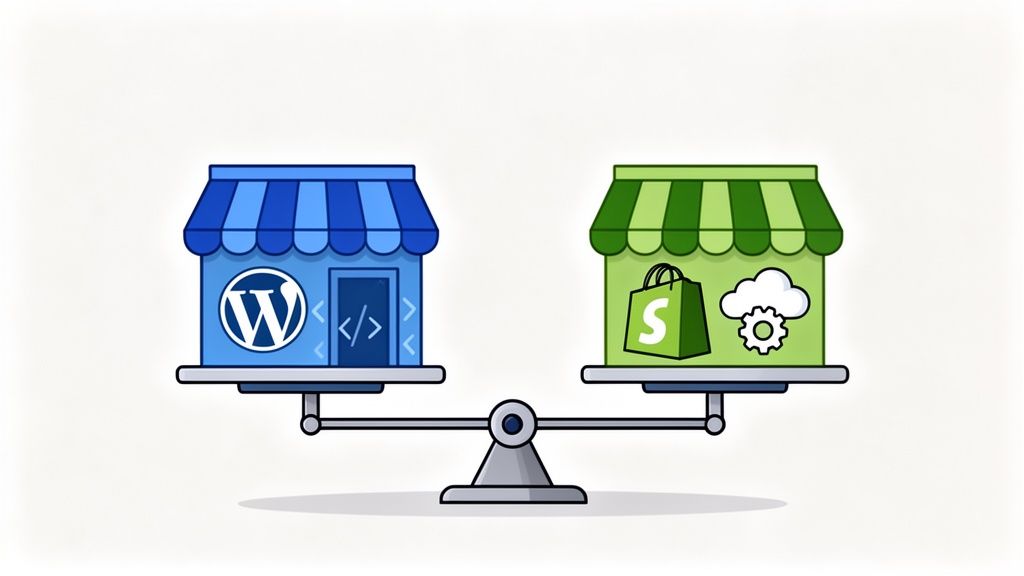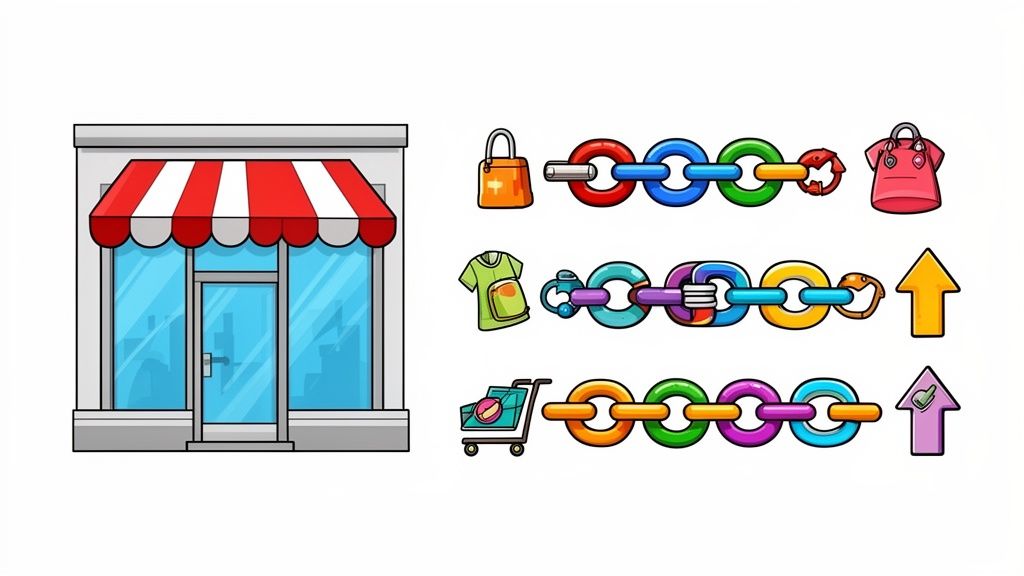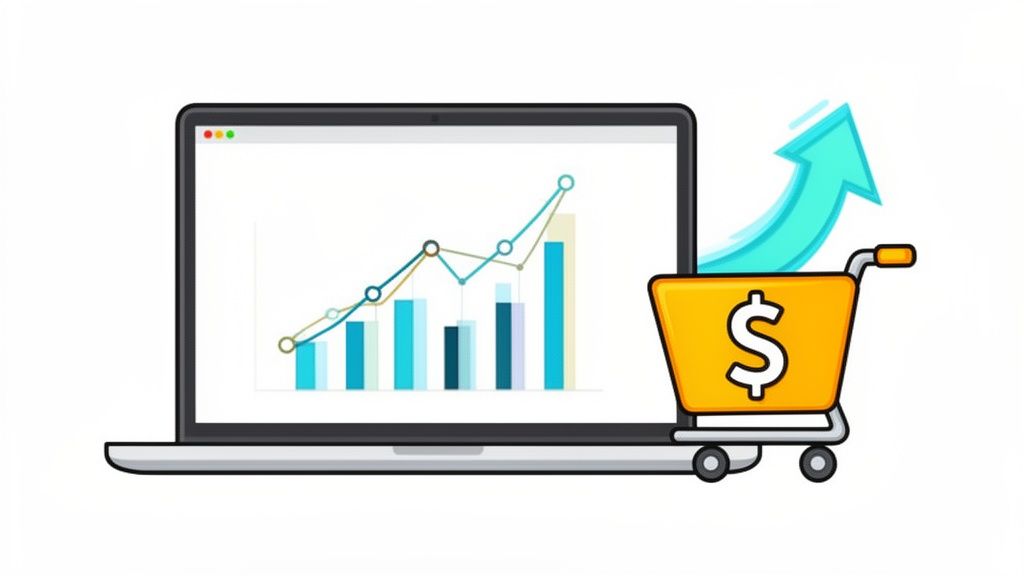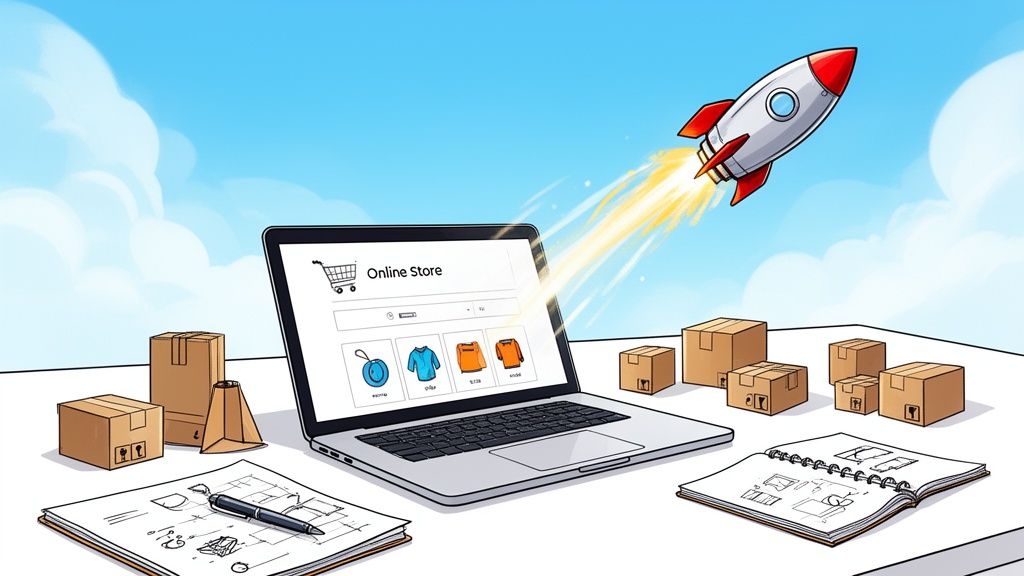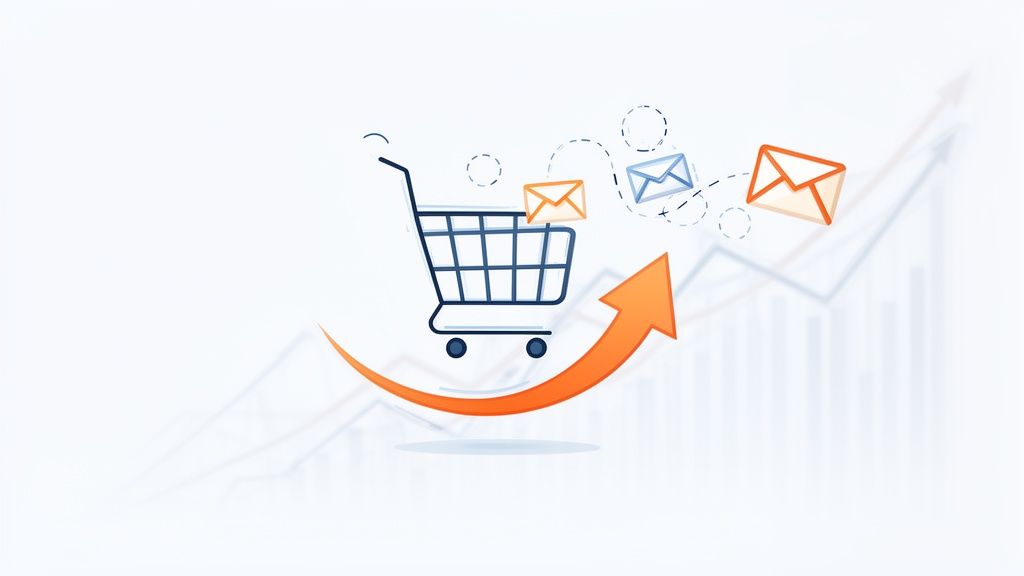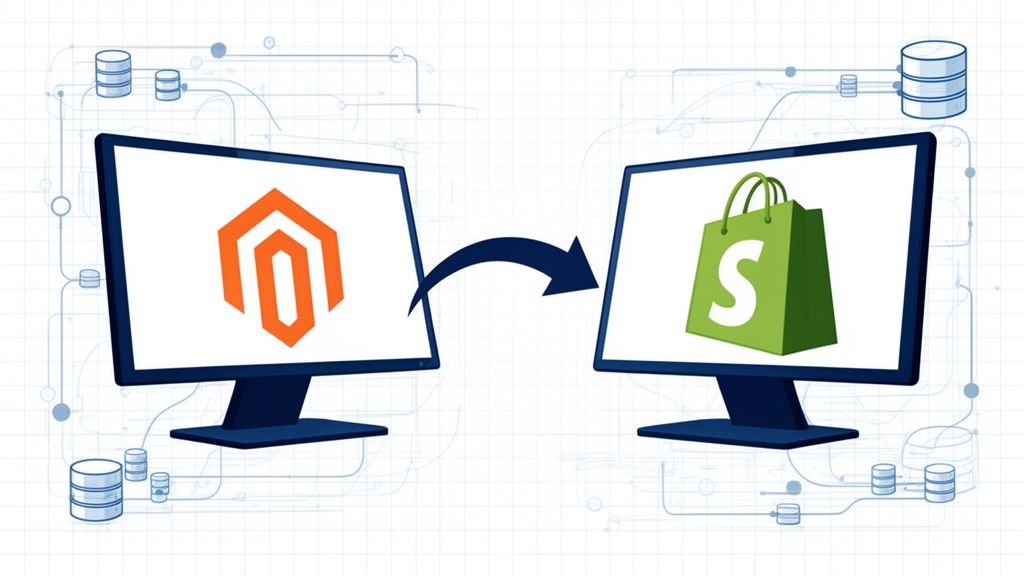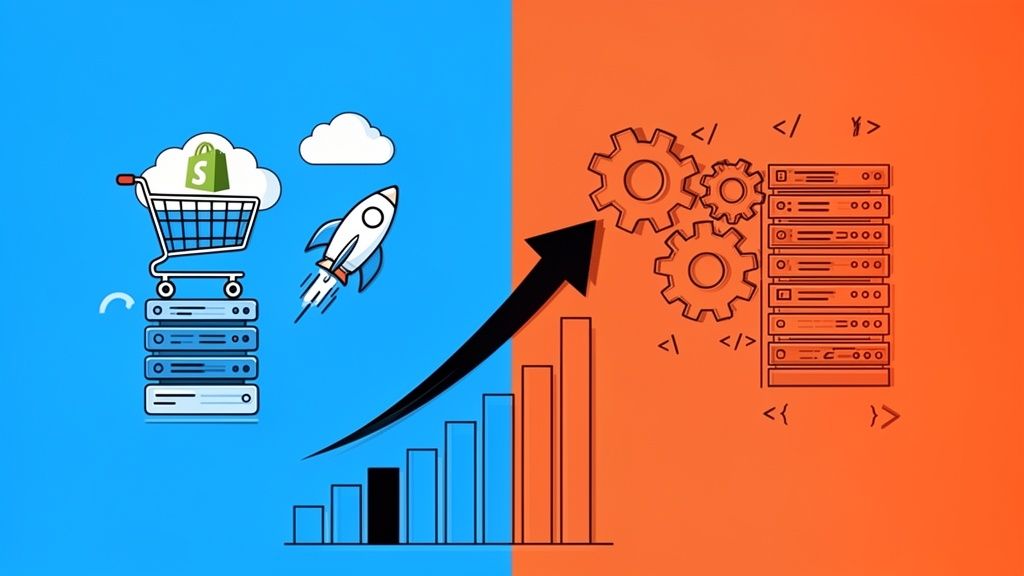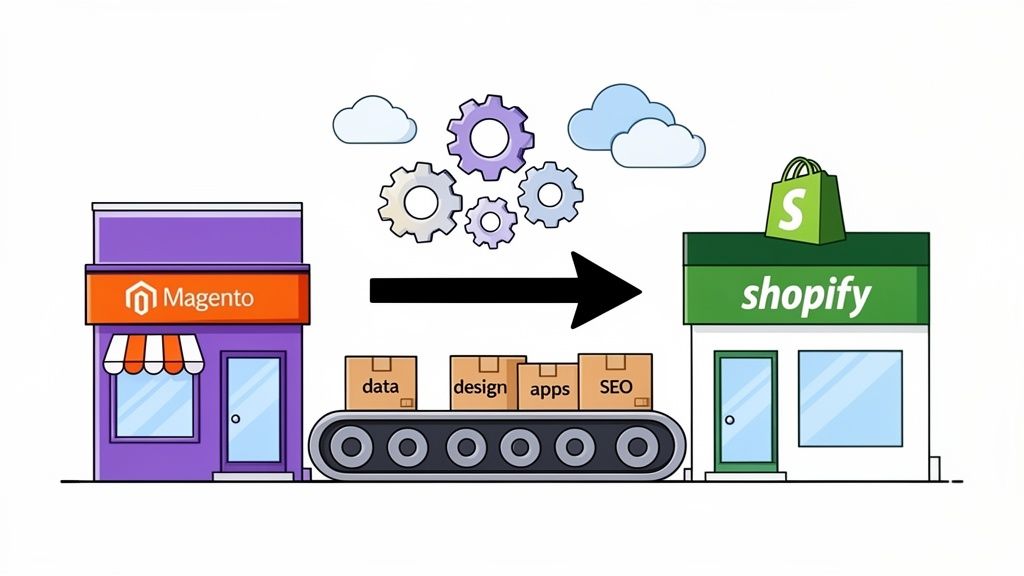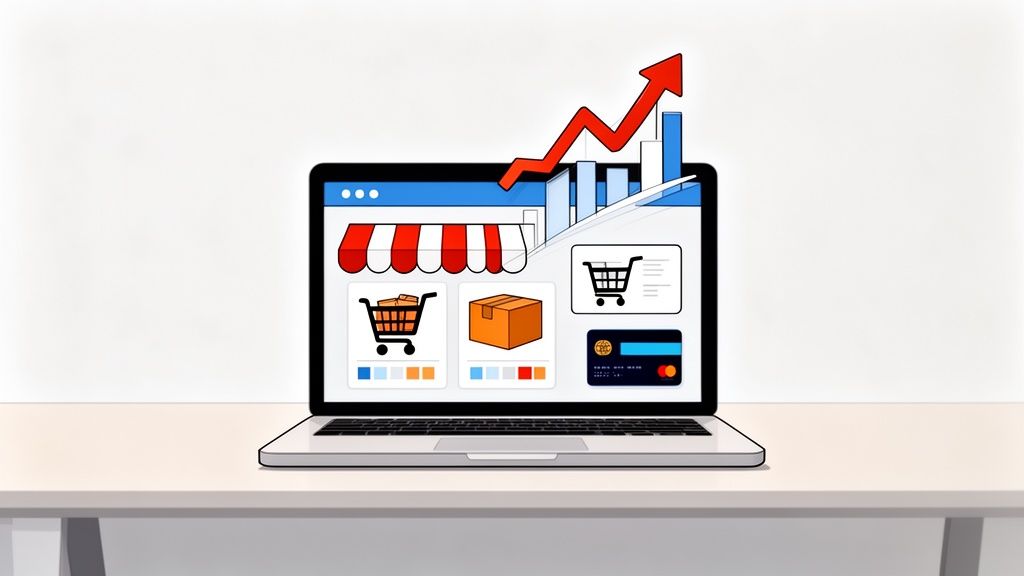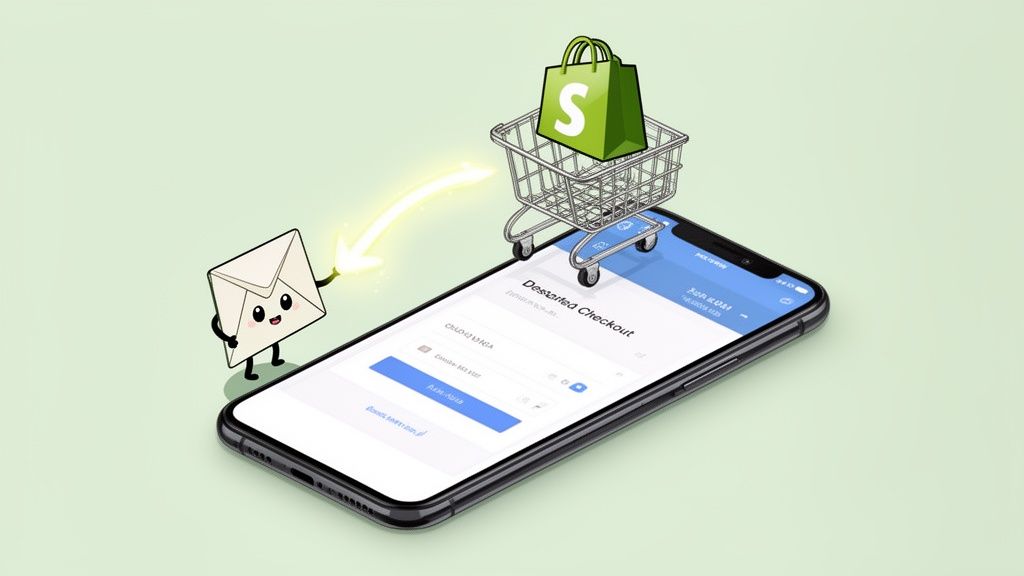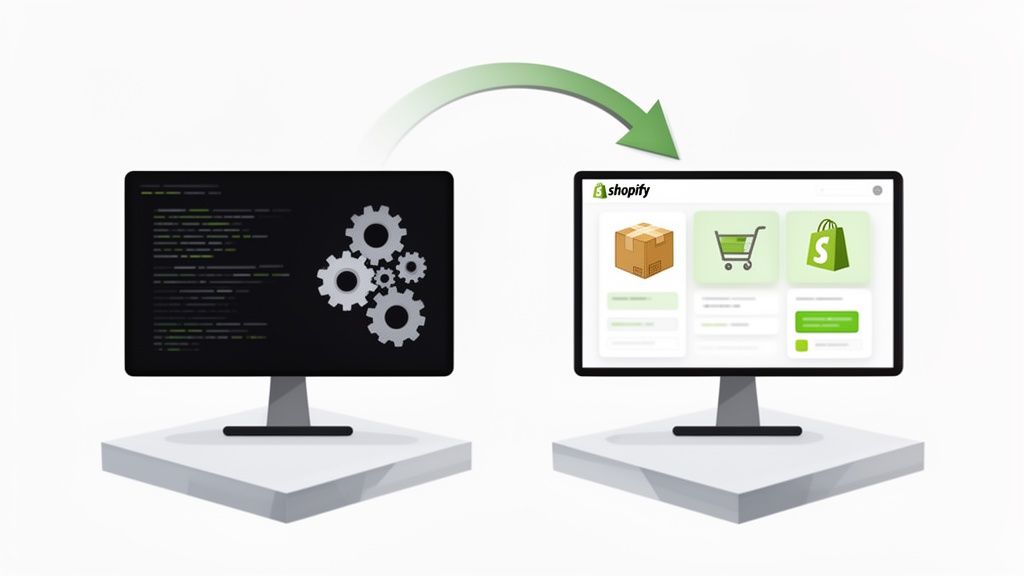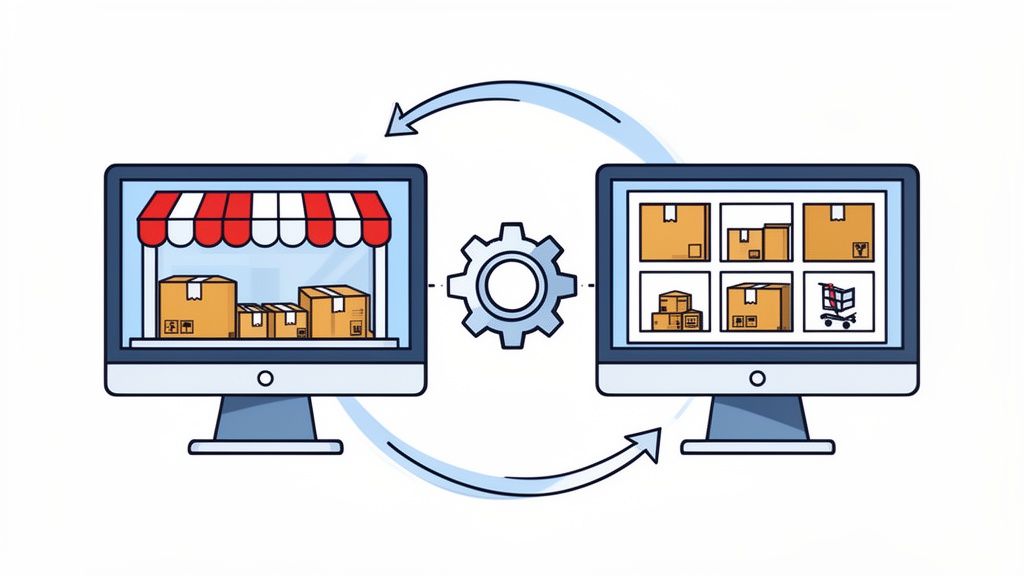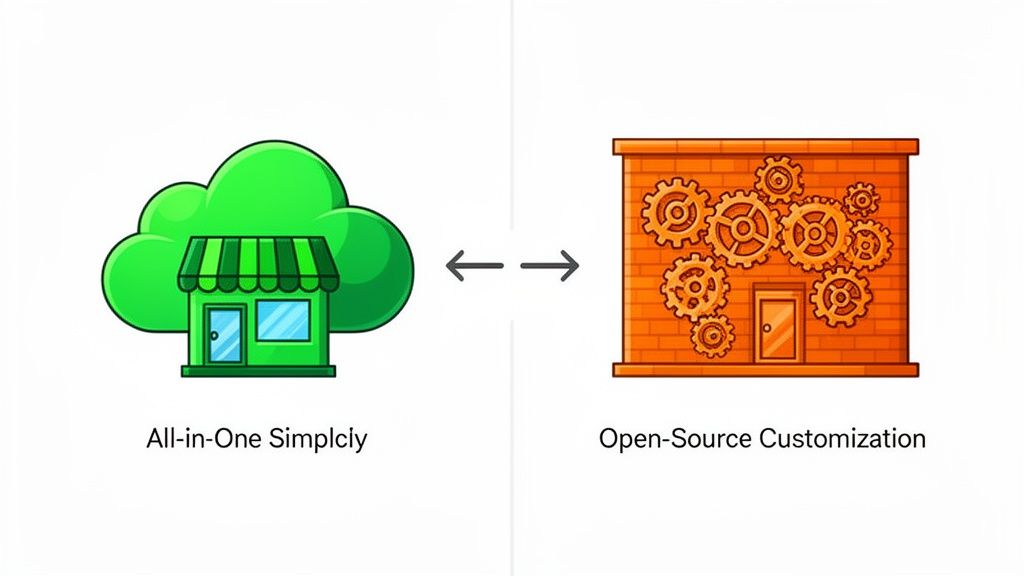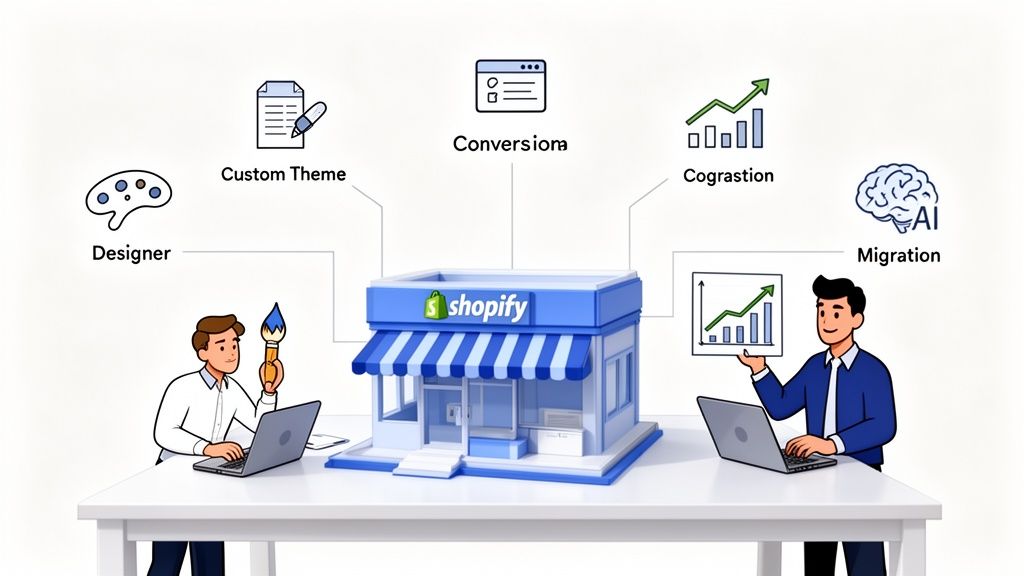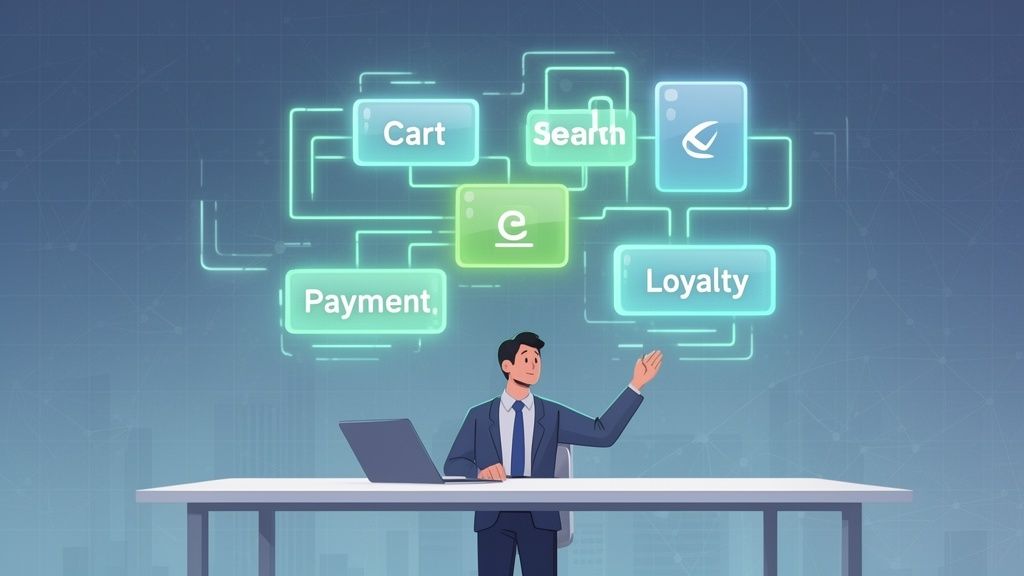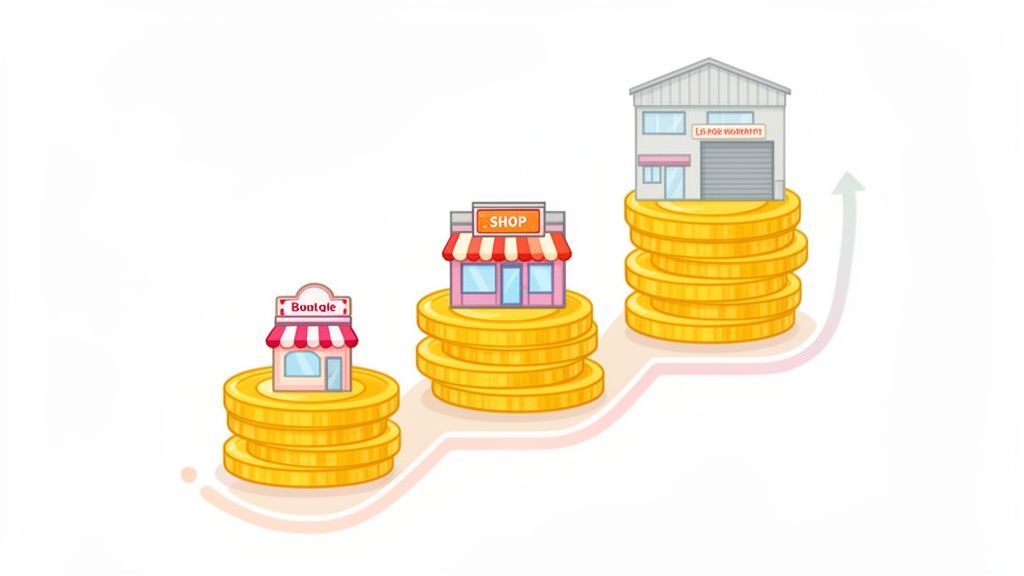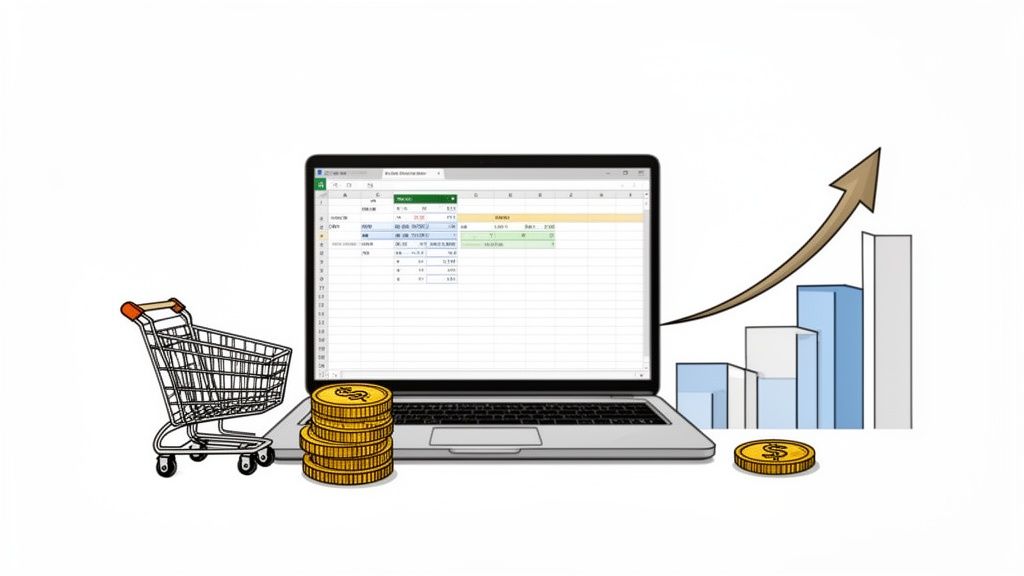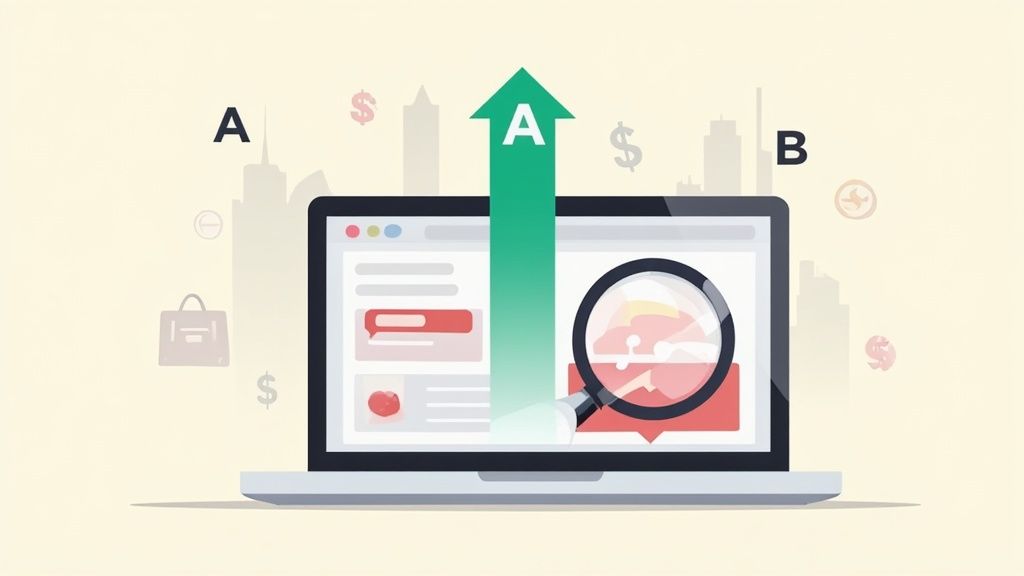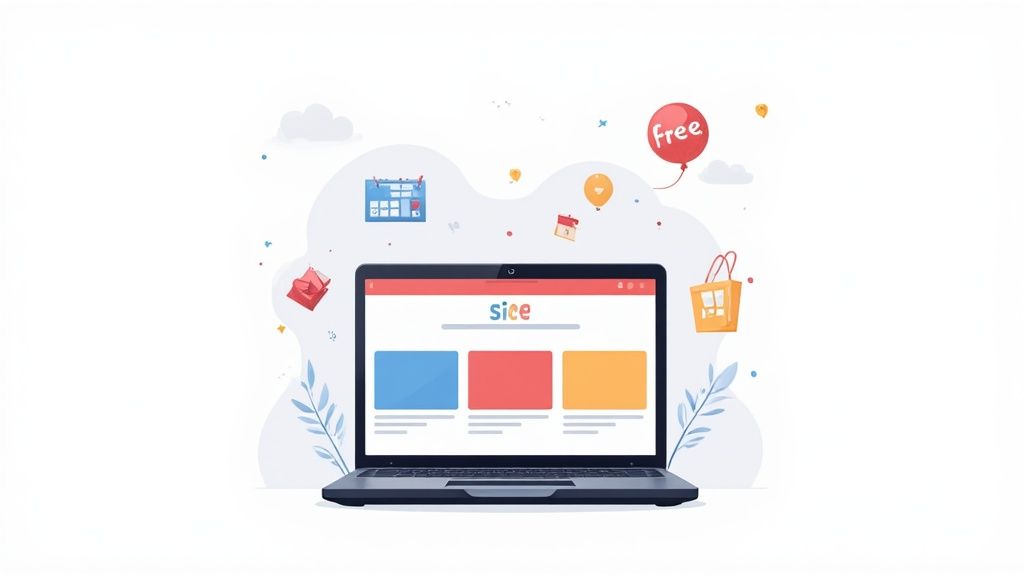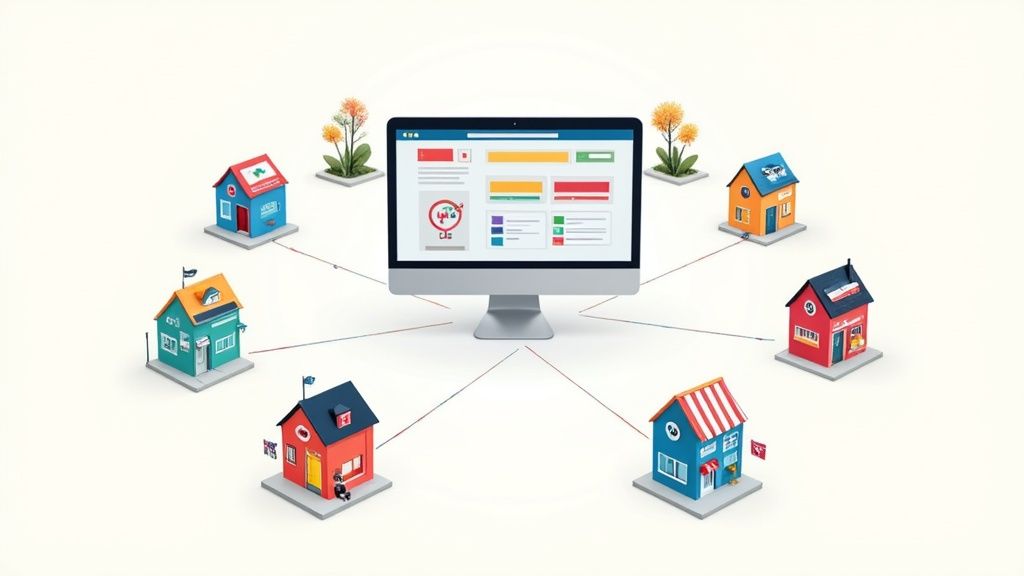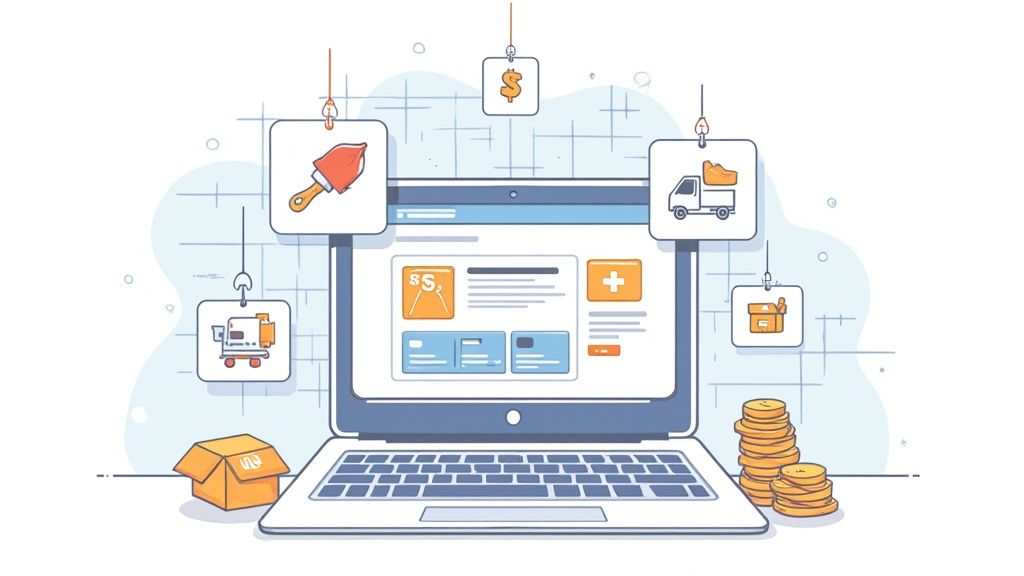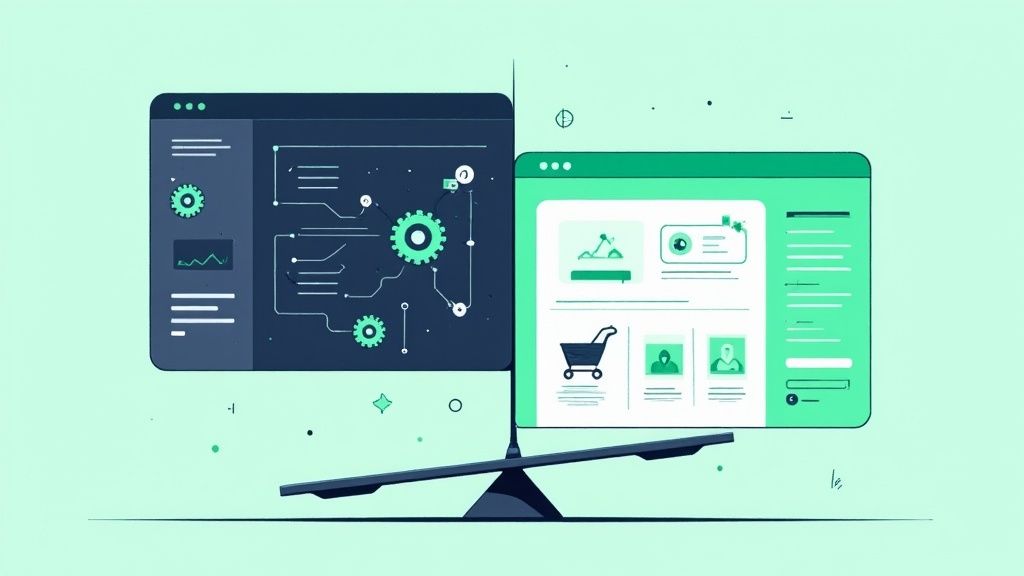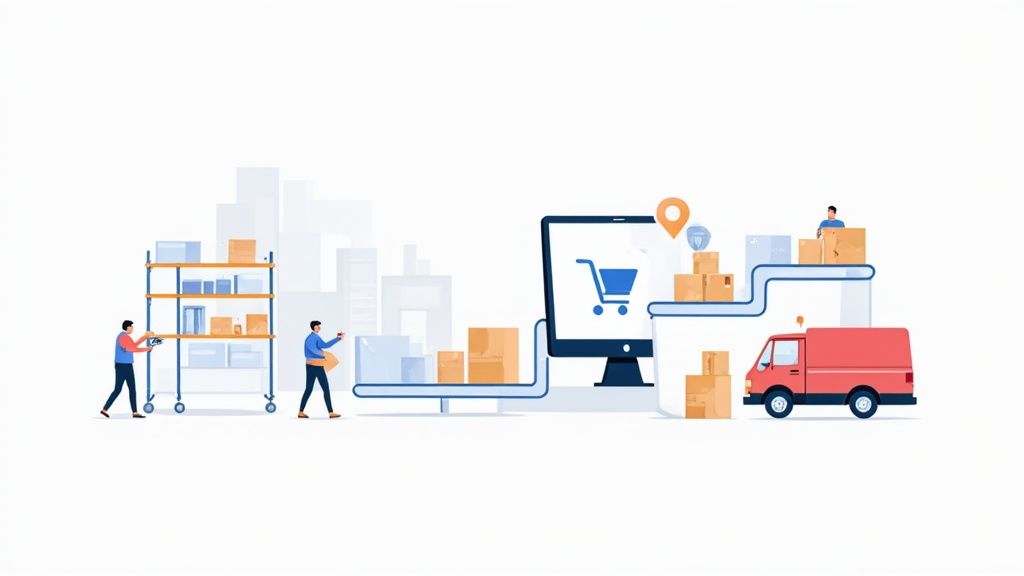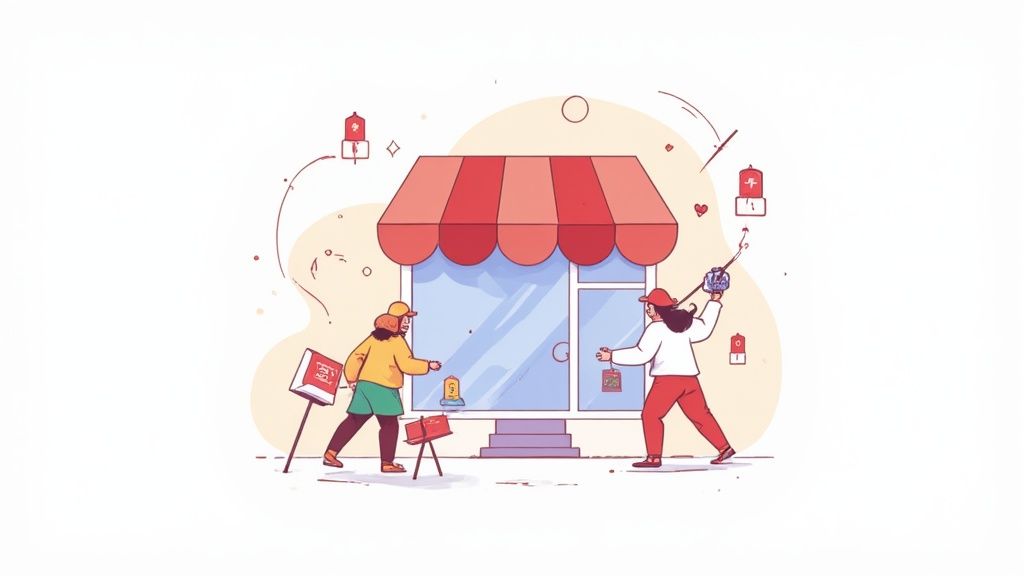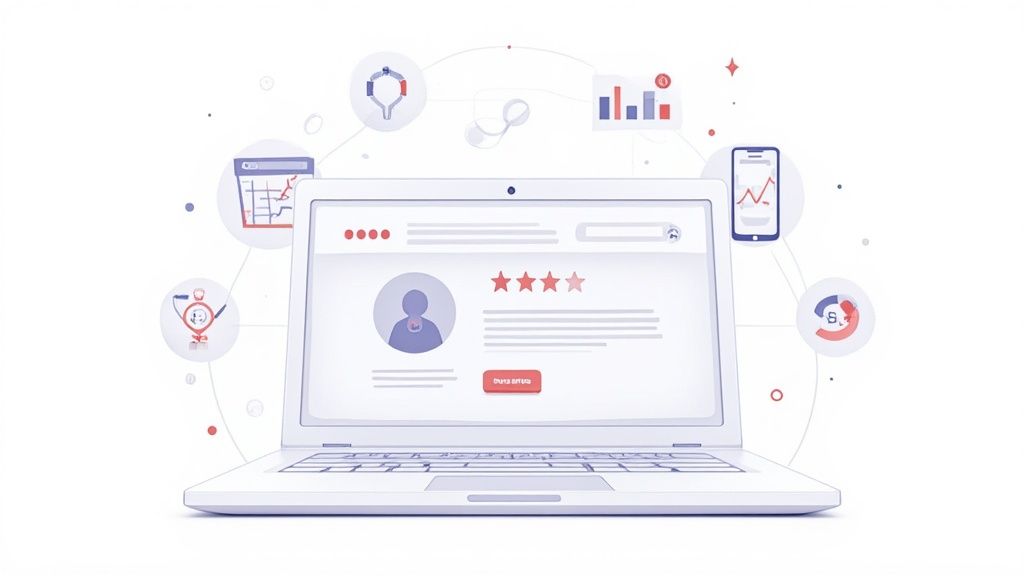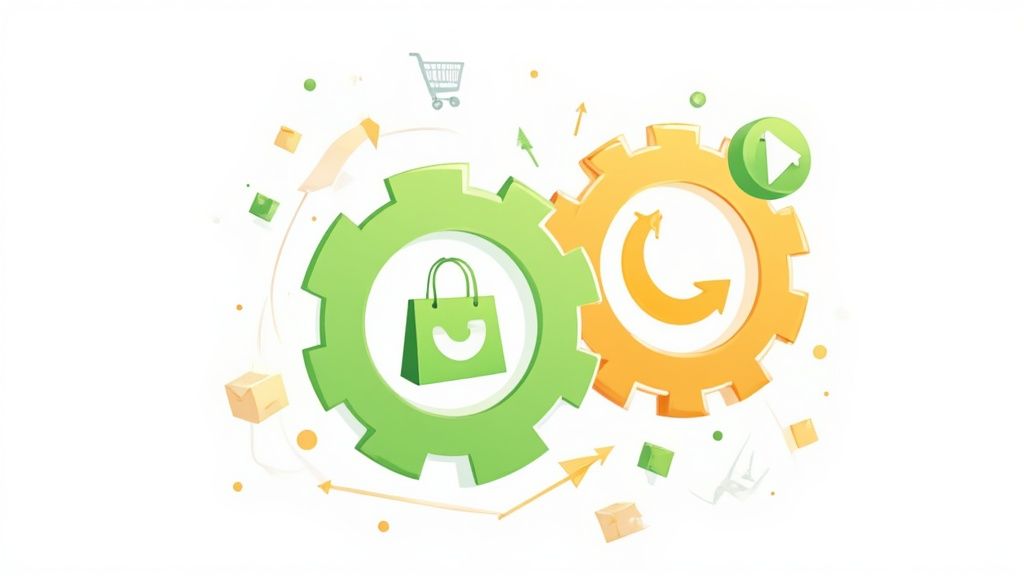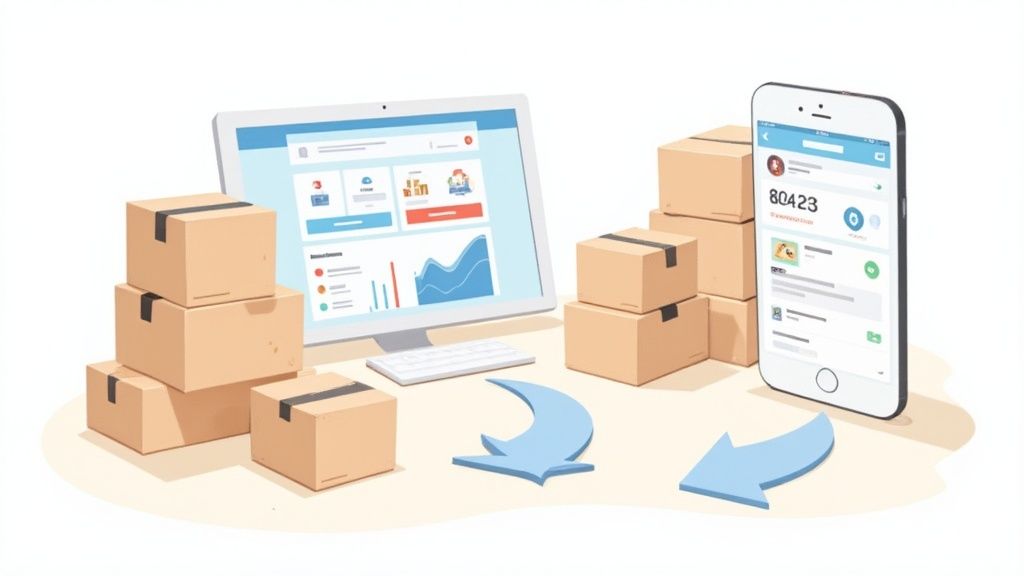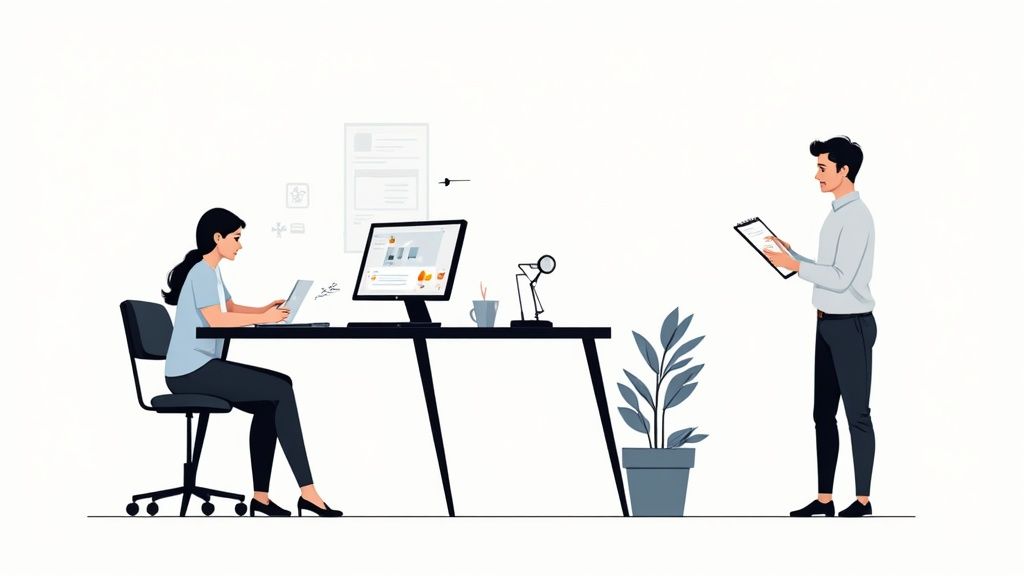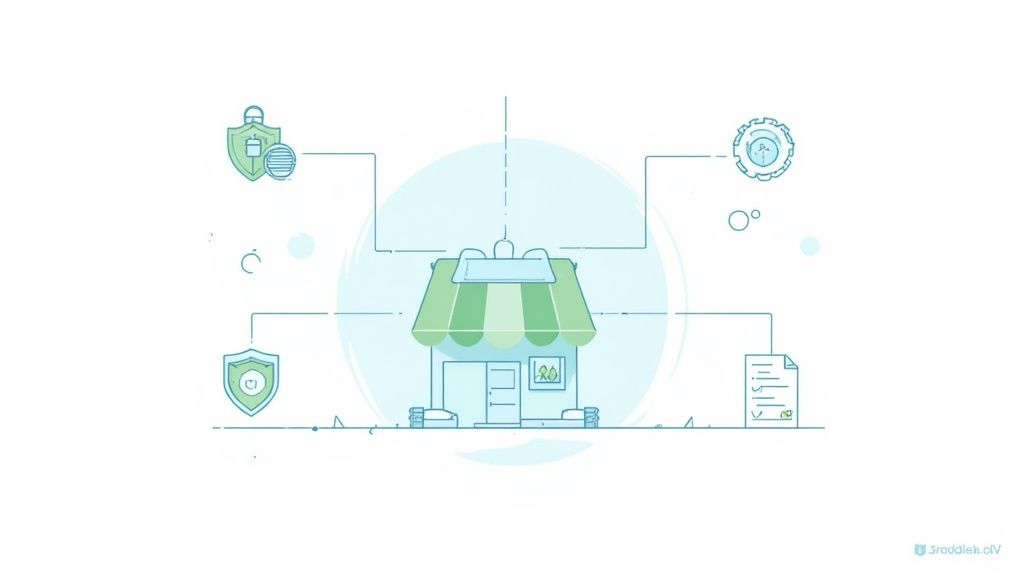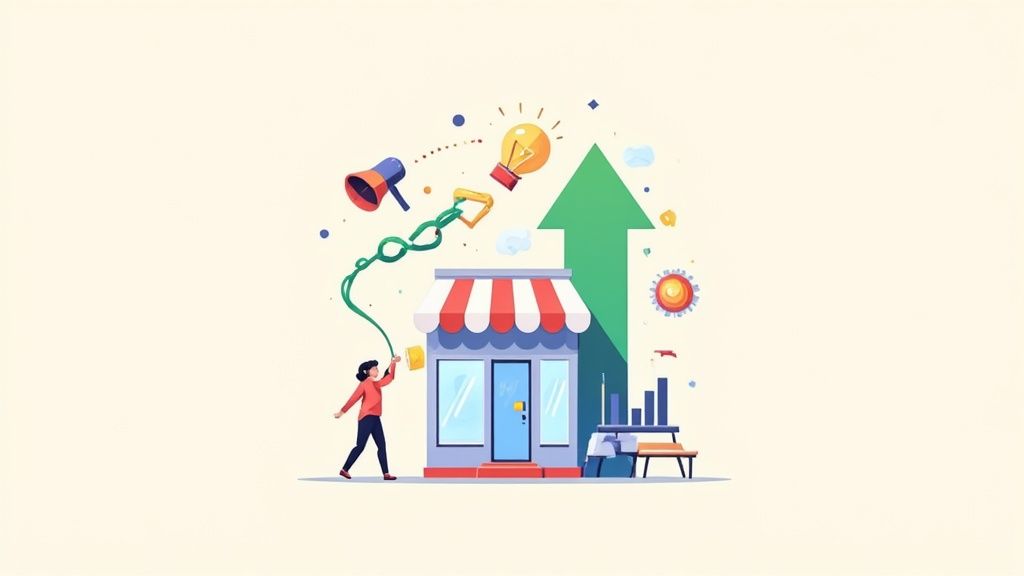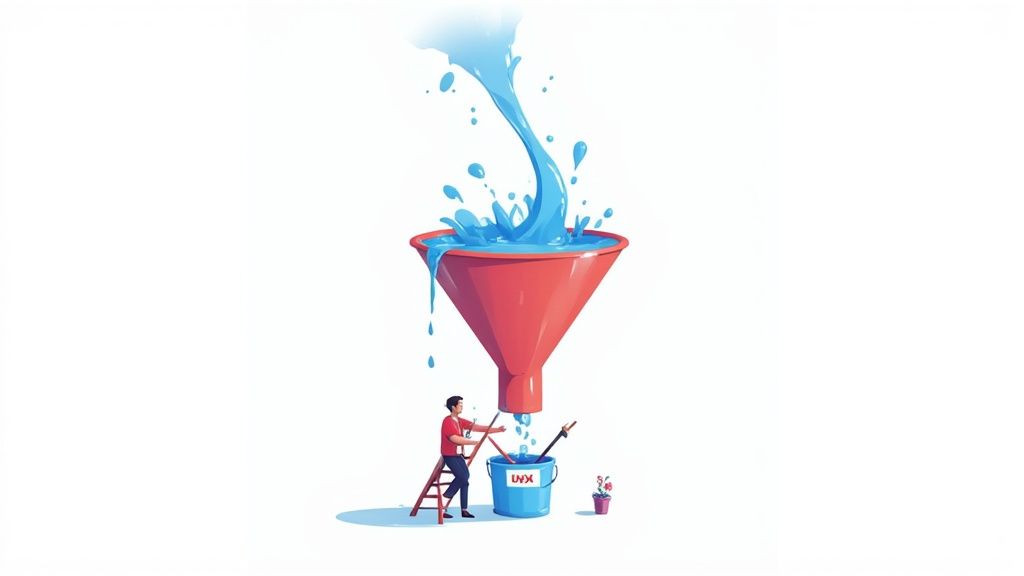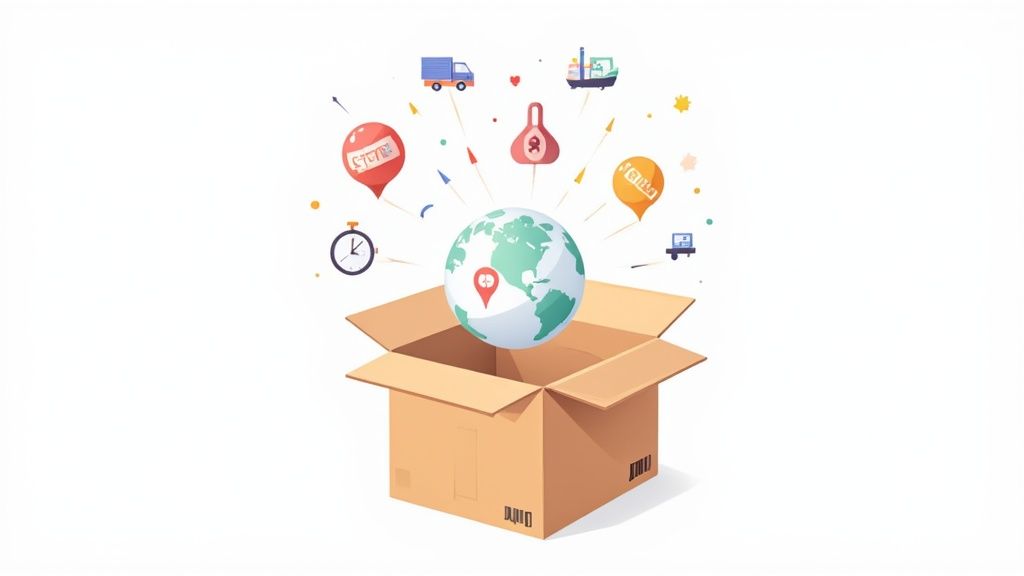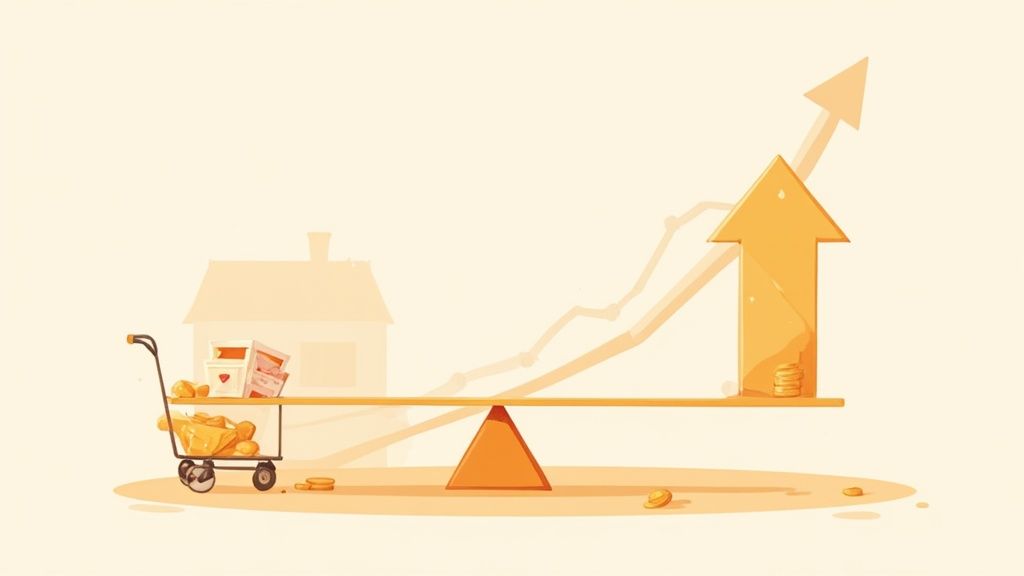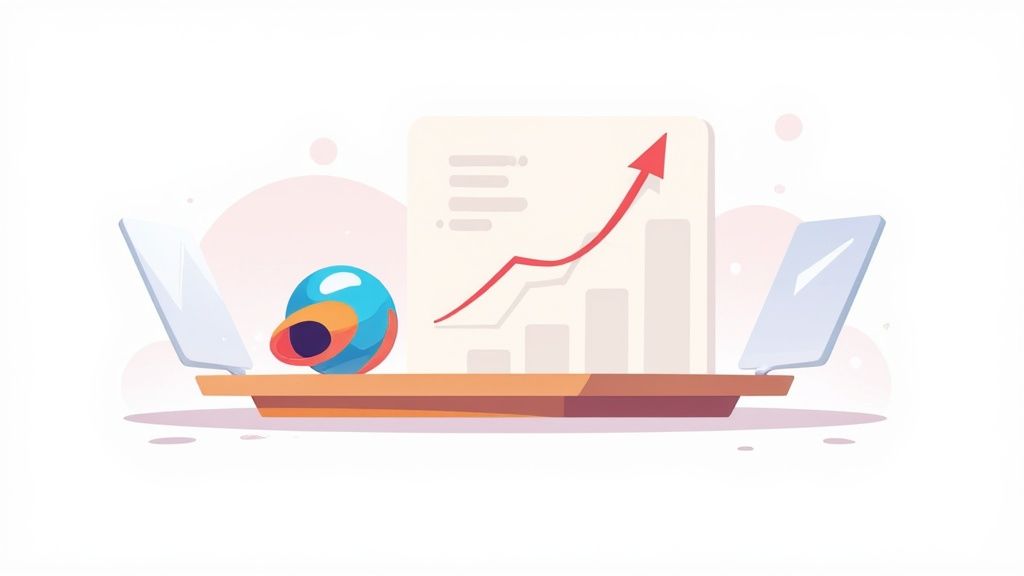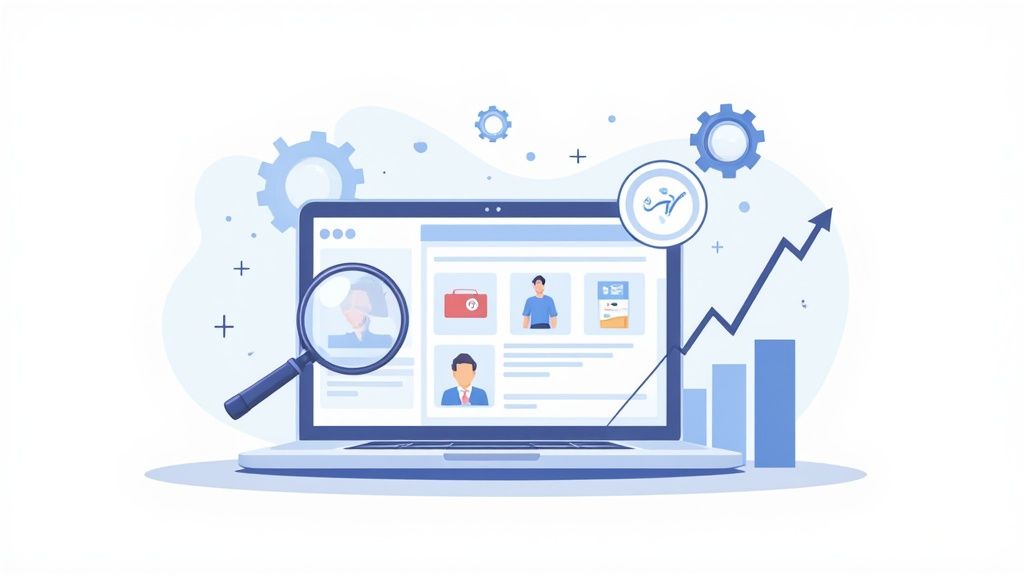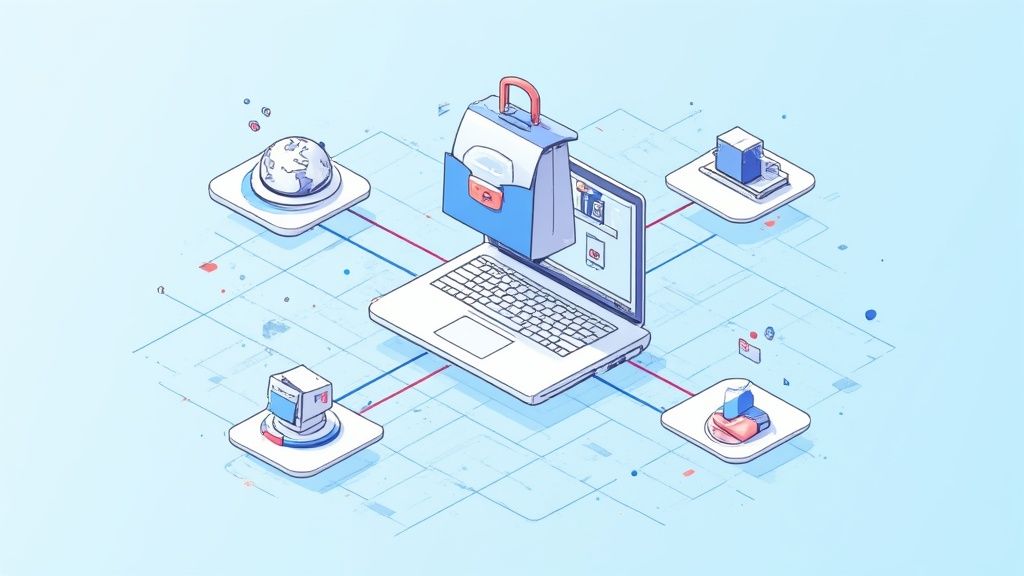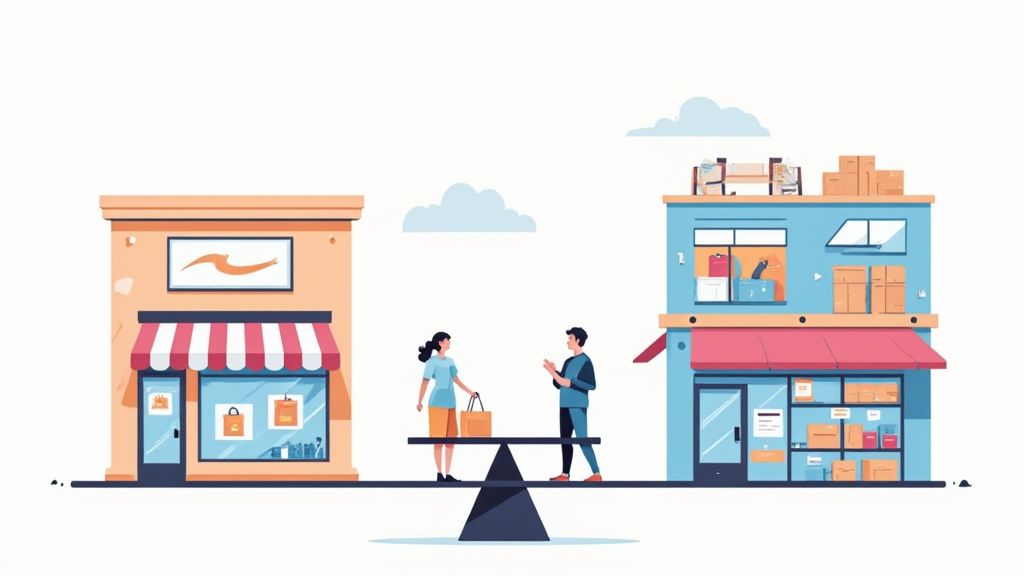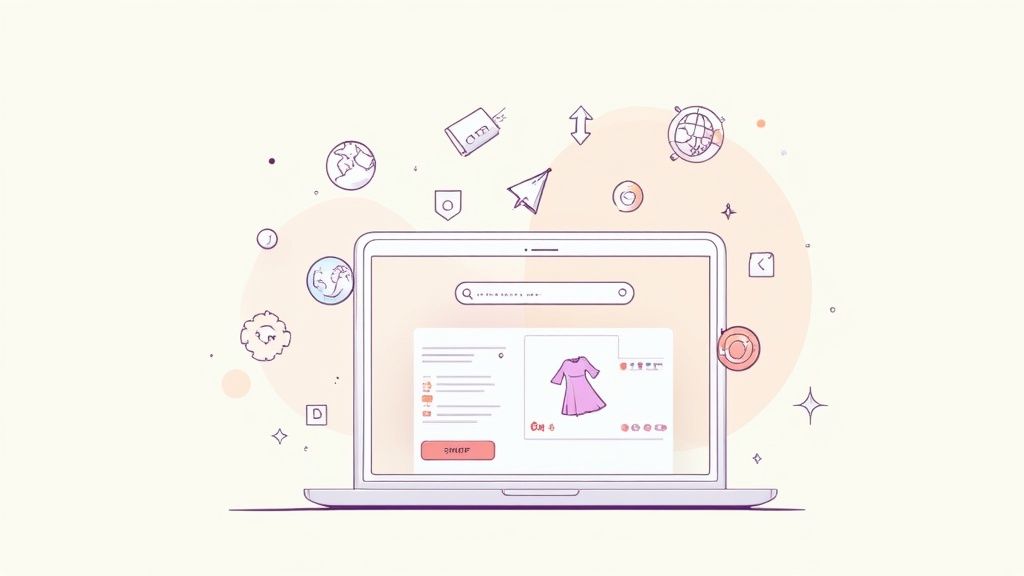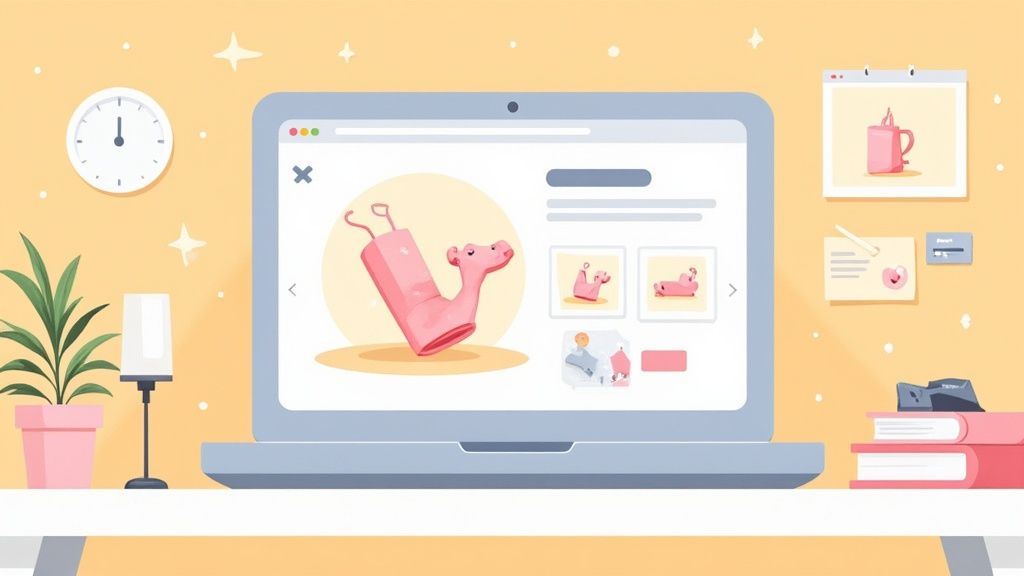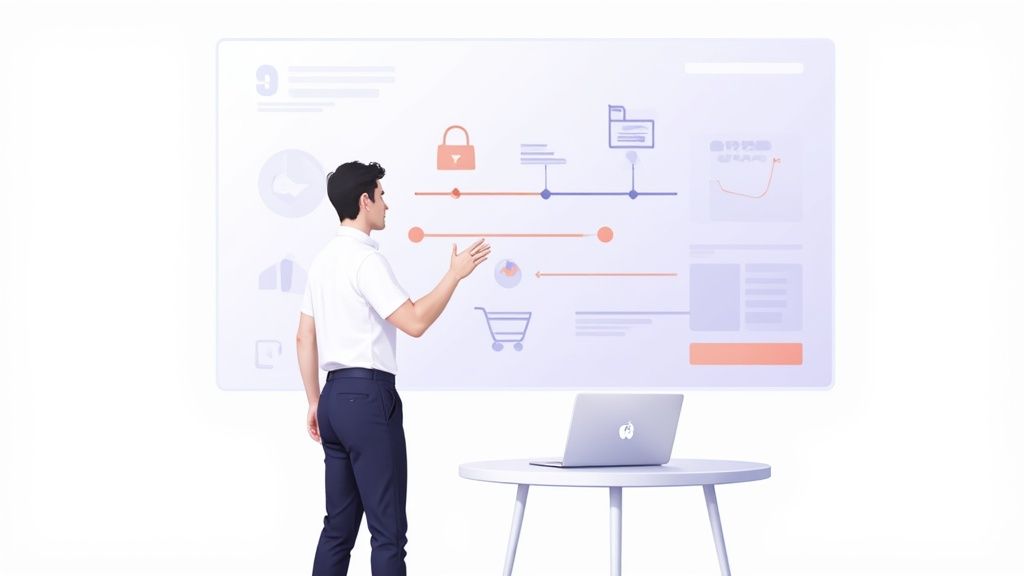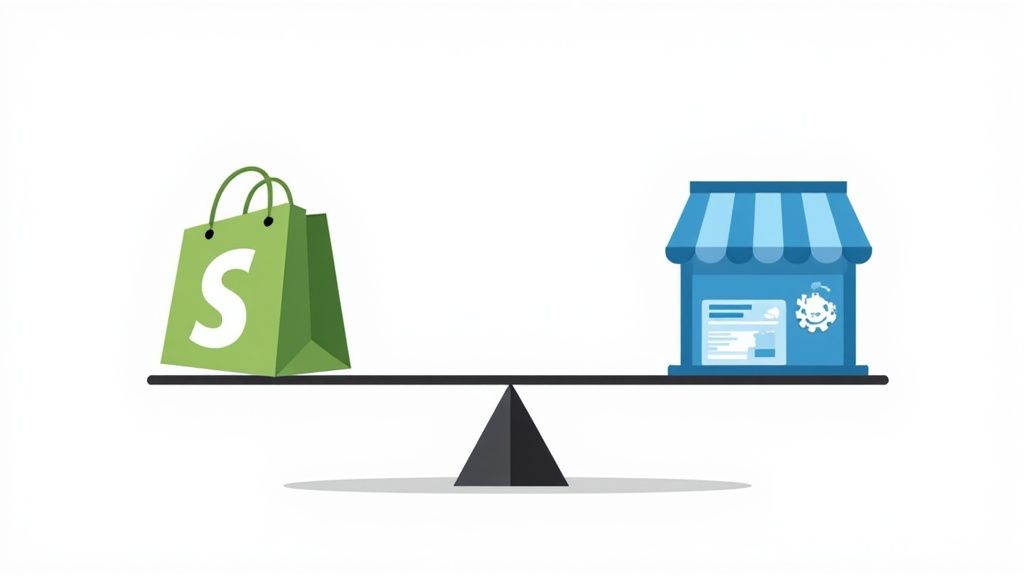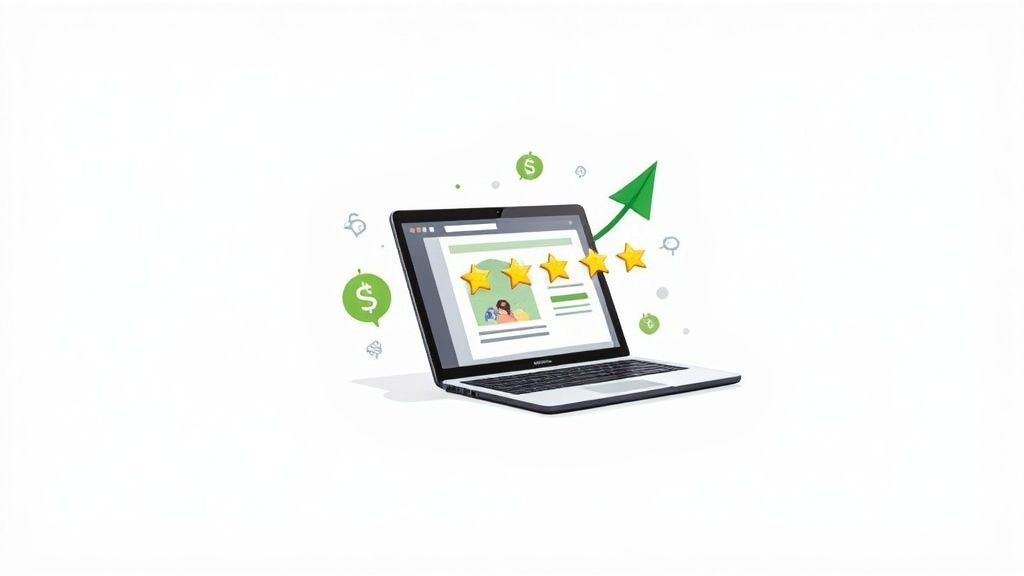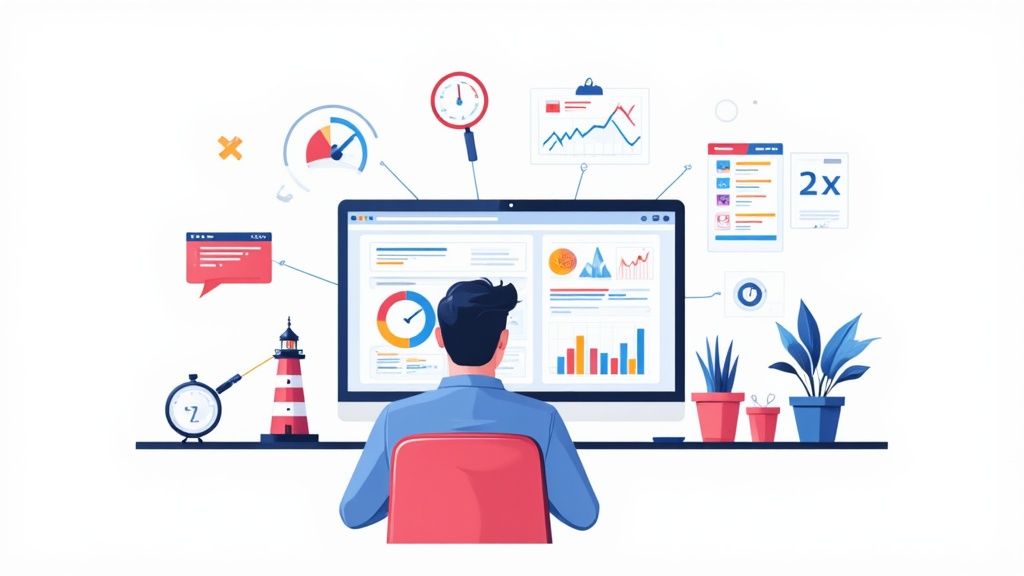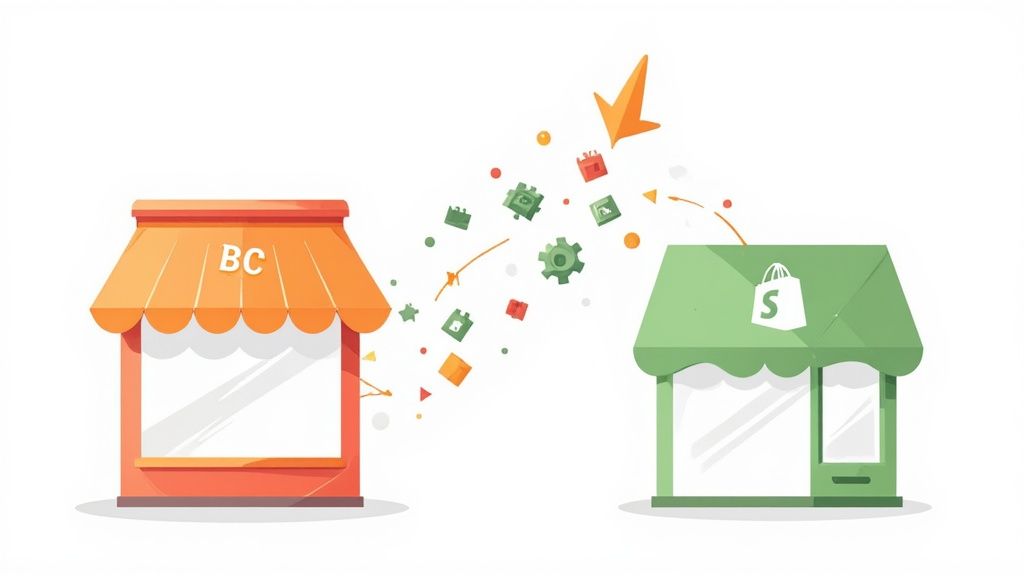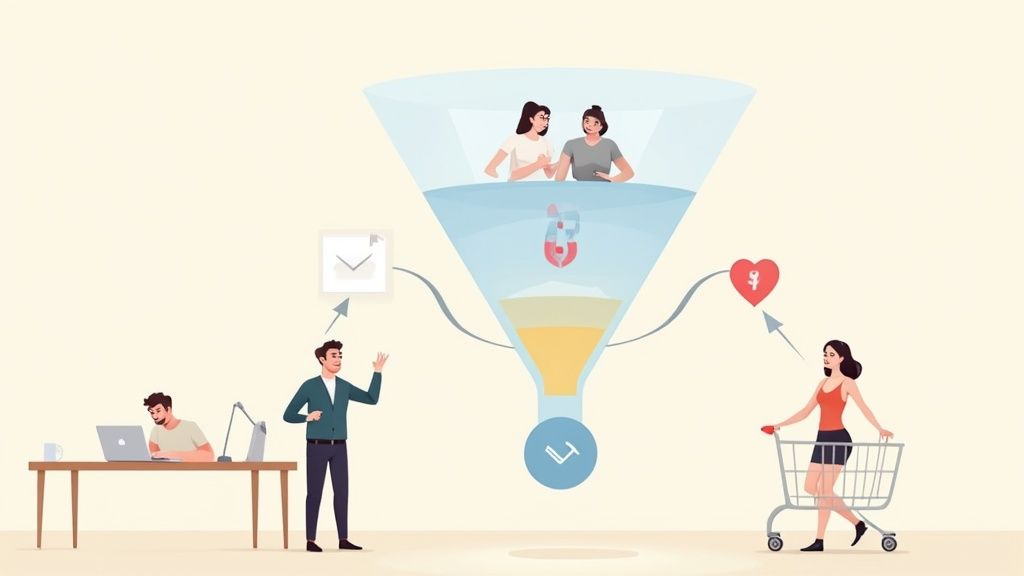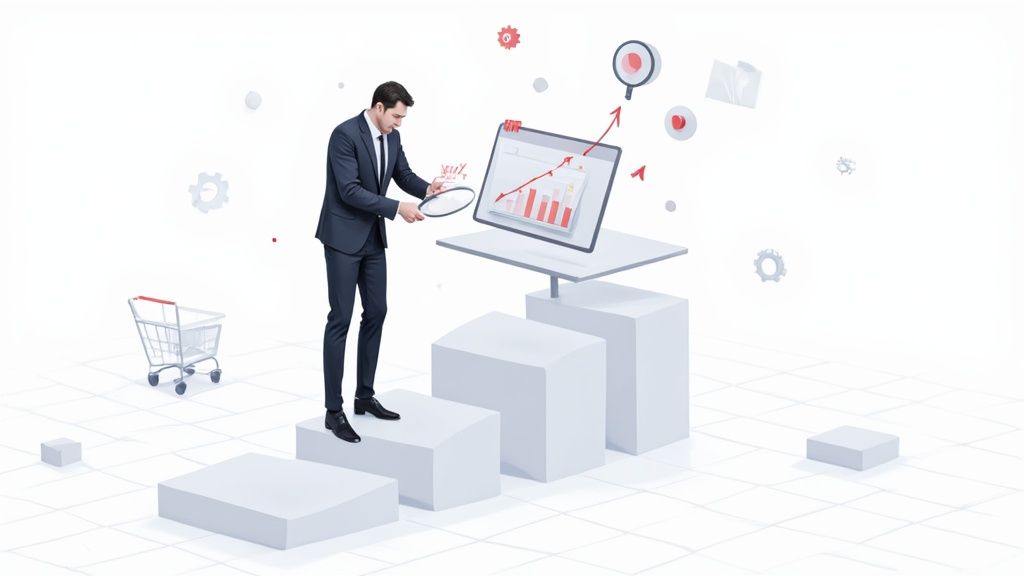
Ecommerce consulting services offer expert, third-party guidance to help online businesses solve tough problems and grow faster. Think of a consultant as a specialized doctor for your online store—they diagnose the deep-rooted issues, write a prescription in the form of a strategic roadmap, and guide the treatment to get your store back to peak health and performance.
What Does an Ecommerce Consultant Actually Do?
Let's use an analogy. Imagine your online store is a high-performance race car. You've built it with a powerful engine and a sleek design, but for some reason, it's stuck in second gear. Sure, it runs, but it's definitely not winning any races. You're so close to the machine that you can't pinpoint the problem. Is it the fuel mix? The aerodynamics? Maybe the driver's technique?
This is exactly where an ecommerce consultant steps in, acting as your specialized pit crew chief. They aren't just another mechanic tightening a few bolts. They're strategists who bring an objective, expert eye to your entire operation. Their job is to look past the obvious symptoms, like sluggish sales, and diagnose what's really causing the problem.
This diagnostic process is the cornerstone of great ecommerce consulting services. A consultant doesn't just show up with a bunch of opinions; they perform a full-scale health check on your business.
A Holistic Business Diagnosis
A great consultant knows that an ecommerce business is a complex machine with many interconnected parts. A problem in one area can easily cause symptoms to pop up somewhere else entirely. That's why they don't just look at one thing; they conduct a holistic review.
This usually involves digging into a few key areas:
- Customer Experience (CX) Audit: Walking through the entire customer journey, from the first time someone sees your ad to the moment they complete checkout. They're looking for any friction points that make people leave.
- Marketing Funnel Analysis: Putting your SEO, PPC, email, and social media campaigns under the microscope to see if they're actually attracting the right people and turning them into customers.
- Technology Stack Review: Taking a hard look at your platform (like Shopify or BigCommerce) and all your integrated apps. Are they helping you grow, or are they secretly holding you back?
- Operational Efficiency Check: Peeking behind the curtain at your backend processes—inventory, fulfillment, customer service—to find bottlenecks that are quietly eating into your profits and frustrating your customers.
Once the diagnosis is complete, the consultant’s job shifts from analyst to architect. They don’t just hand you a dense report and wish you luck.
A consultant's true value lies in translating complex data and observations into a clear, actionable growth strategy. They connect the dots between a high cart abandonment rate and a clunky mobile checkout, or between stagnant traffic and a weak SEO foundation.
This strategic roadmap is the main event. It’s a practical, step-by-step plan designed to fix what's broken and unlock your store's true potential. It also prioritizes what to do first based on impact and effort, so you can focus on the changes that will deliver the biggest wins right away. For instance, they might suggest an A/B testing plan for your product pages before you jump into a costly and time-consuming brand overhaul.
Ultimately, an ecommerce consultant is a strategic partner. They bring the expertise, the objective viewpoint, and the detailed plan you need to finally get your race car out of second gear and speeding toward the finish line, achieving real results like more revenue, better profit margins, and a stronger position in the market.
So, what do ecommerce consultants actually do? When you bring one on board, you’re not just getting a slide deck full of advice. You're getting a specialist who rolls up their sleeves and digs into every single part of your online business.
Think of it like hiring a master mechanic for a high-performance race car. They don’t just check the tire pressure; they fine-tune the engine, optimize the aerodynamics, and analyze the driver's performance—all to make the car faster, safer, and more efficient. An ecommerce consultant does the same for your store, focusing on boosting your user experience, driving up revenue, and making your operations run like a well-oiled machine.
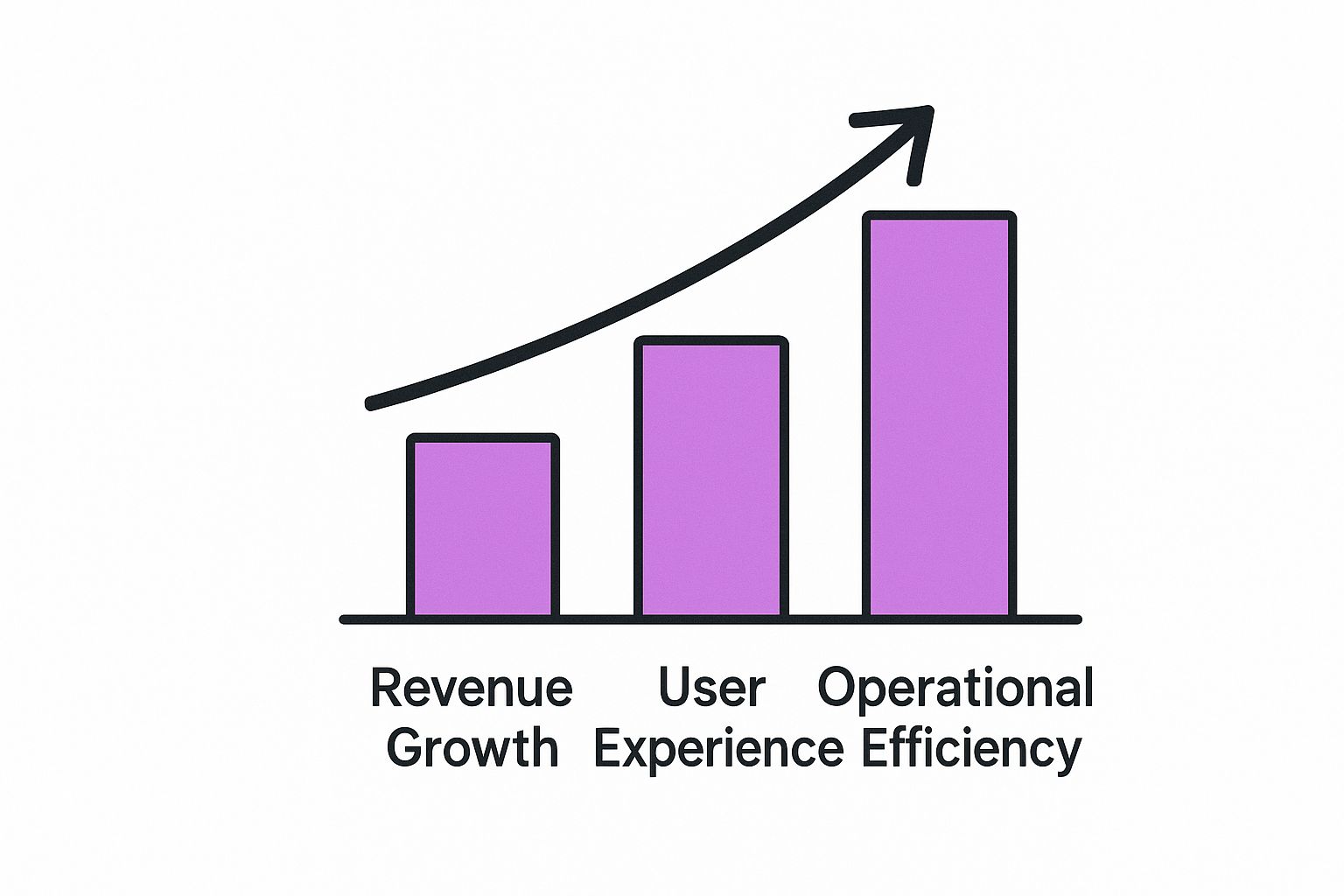
As you can see, these core pillars—Strategy, Conversion, and Technology—all feed into each other. A weakness in one area will inevitably pull the others down. A great consultant addresses them all. Let's look at the specific services that fall under these areas.
To give you a clearer picture, here’s a breakdown of the key domains where ecommerce consultants typically focus their efforts. This can help you pinpoint exactly where your business needs the most help.
Key Ecommerce Consulting Service Areas
Each of these areas is a critical piece of the puzzle. A holistic approach that considers all three is what separates struggling stores from the ones that consistently grow.
Strategic Audits and Digital Marketing
A consultant's first job is almost always a deep-dive audit to get a brutally honest look at where you stand today. This isn't just a quick glance at your homepage. It's a full-blown investigation into your digital marketing. They'll analyze your Search Engine Optimization (SEO) to figure out why you’re not showing up on Google, pick apart your Pay-Per-Click (PPC) campaigns to find and eliminate wasted ad spend, and review your email marketing to see how you can bring customers back again and again.
The whole point is to find the leaks in your marketing funnel and plug them with strategies that are backed by real data, not guesswork.
Conversion Rate Optimization (CRO)
Getting people to your website is one thing. Getting them to actually buy something is a completely different ballgame. That’s where Conversion Rate Optimization (CRO) comes in. It's the art and science of turning more of your hard-earned visitors into customers. A consultant acts like a detective, carefully tracing the customer journey to find points of friction.
- Website Flow Analysis: They pinpoint exactly where users get stuck, confused, or frustrated—from the main navigation right down to the "Complete Purchase" button.
- Checkout Process Refinement: A clunky, confusing checkout is the #1 killer of sales. Consultants often redesign this process to be simpler, faster, and more trustworthy, which can have a massive impact on cutting down abandoned carts.
- A/B Testing: They don't guess what works. They implement structured tests on product pages, calls-to-action, and layouts to see what actually convinces your audience to click "buy."
For instance, maybe an audit reveals that 73% of your mobile visitors are dropping off at the payment screen. A consultant would then propose and test a streamlined mobile checkout with one-click options like Apple Pay or Google Pay, which could dramatically lift your mobile conversion rate. This is the kind of hands-on work we specialize in with our ecommerce consulting services.
Technology and Operations Advisory
Your tech stack—all the software and platforms that power your store—is the central nervous system of your business. If it’s messy or outdated, it can cause huge operational headaches and put a cap on how much you can grow.
A consultant offers an unbiased, expert opinion on your technology. They make sure your platform (like Shopify, Magento, or BigCommerce) and all your integrated apps are working for you, not against you. The goal is an ecosystem that can easily scale as your business grows.
This isn't just about your storefront, either. A huge part of consulting is finding ways to make your backend operations more efficient, often through smart automation. There are tons of great business process automation examples that apply here. A consultant might recommend and help you implement new systems for:
- Supply Chain and Inventory Management: Using better forecasting tools to prevent running out of your bestsellers or getting stuck with too much of a slow-moving product.
- Customer Service Systems: Integrating tools like helpdesks or chatbots to give customers faster answers without burning out your support team.
- Fulfillment and Logistics: Analyzing your shipping strategy to find ways to cut costs and speed up delivery times—a huge factor in keeping customers happy and loyal.
By tackling strategy, conversions, and technology together, ecommerce consulting provides a complete blueprint for building a business that doesn't just survive, but thrives.
It’s a tough pill to swallow, but recognizing when you need to call in a specialist is a vital business skill. As a business owner, you’re so deep in the day-to-day trenches that it’s almost impossible to see the bigger picture—or the systemic issues holding you back. This is where an ecommerce consultant brings immense value, offering a fresh, unbiased perspective that can spotlight the blind spots and inefficiencies your team is just too close to see.
Knowing the right time to seek help can save you from months, or even years, of frustrating and expensive trial and error. When you hit a wall that your team doesn't have the specific expertise to break through, bringing in an expert isn't an admission of defeat. It's a strategic move.
Here are the tell-tale signs that it’s time to bring in a pro.
Signs Your Business Needs an Ecommerce Consultant
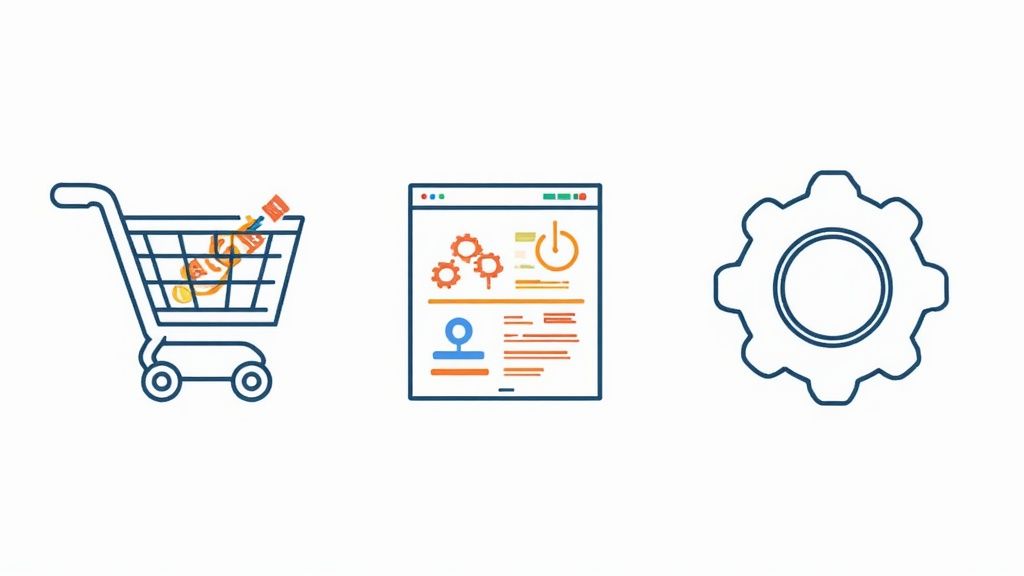
Your Sales Have Hit a Plateau
This is the classic reason businesses pick up the phone. Your traffic might be holding steady or even climbing, but your revenue has completely flatlined. You’ve tried everything in your playbook—more ads, new products, extra email campaigns—but nothing is moving the needle.
A sales plateau is rarely just a sales problem. It's a clear symptom of a deeper issue. It could be a clunky user experience on your site, a marketing message that no longer connects, or pricing that’s out of sync with your audience. A consultant will dissect your entire sales funnel, pinpointing the exact spots where customers are dropping off and building a data-backed plan to plug the leaks.
Stagnant growth isn't just a sales problem; it's a strategy problem. A consultant's job is to diagnose the root cause of the plateau and provide the strategic pivot needed to break through and resume scaling successfully.
Your Customer Acquisition Costs Are Skyrocketing
Another major red flag is when your Customer Acquisition Cost (CAC) keeps creeping up without a matching increase in Customer Lifetime Value (CLV). You’re essentially spending more and more money on ads just to attract the same number of new customers. It’s an unsustainable cycle that will eventually eat away at your profits.
This trend has become particularly pressing as the market adjusts to new privacy standards. It's no surprise that within marketing consulting, digital marketing services hold a dominant 31.6% share, largely because businesses need expert guidance to navigate these very challenges. If you're curious, you can explore more data on these market dynamics to see why this expertise is in such high demand.
A good consultant can dive into your marketing mix, sharpen your audience targeting, and streamline your conversion paths to bring in customers more efficiently and protect your bottom line.
You Suffer From Operational Bottlenecks
Growth is a great problem to have, until it isn't. Rapid scaling has a way of exposing every crack in your operational foundation. If your team is constantly putting out fires, scrambling to fulfill orders, and struggling to keep up, you’re dealing with serious operational bottlenecks. These snags lead to shipping delays, inventory errors, and a poor customer experience that chips away at hard-won trust.
Be on the lookout for these signs of operational chaos:
- Frequent Stockouts: You’re always running out of your best-selling items, leaving money on the table and disappointing loyal customers.
- Shipping Errors: The number of wrong orders is climbing, driving up return costs and damaging your brand’s reputation with every mistake.
- Customer Service Overload: Your support team is drowning in tickets about shipping times, incorrect orders, and product availability.
These aren't just "growing pains." They are clear signals that your current processes can't handle your scale. An ecommerce consultant can map out your entire workflow—from inventory management to fulfillment—and implement the systems and automations needed to build a solid foundation for your next stage of growth.
How to Choose the Right Ecommerce Consultant
Picking the right partner is, without a doubt, the most important step you'll take. A bad fit can burn through your budget, waste months of your time, and leave you with nothing but frustration. But the right partner? They act as a force multiplier for your business, driving real growth and helping you build a much stronger, more resilient operation.
Think of it like hiring an architect to build your dream house. You wouldn't hire a skyscraper specialist to design a cozy beach cottage. You need someone whose skills, style, and hands-on experience are a perfect match for your vision. The exact same logic applies when you’re evaluating ecommerce consulting services.
This is about more than just a slick sales pitch. It’s about digging into their process, verifying their expertise, and making sure you’ve found a genuine partner who is as invested in your success as you are.
Verify Their Niche and Platform Experience
Ecommerce isn’t a one-size-fits-all game. The playbook for a fast-fashion brand is completely different from what a B2B industrial parts supplier needs. So, your first filter should be simple: does this consultant have direct, hands-on experience in your specific corner of the market?
An expert in your vertical already gets it. They understand your customer’s buying habits, the unique headaches of your market, and who your real competitors are. That kind of specialized knowledge is invaluable because they won’t be learning the basics on your dime.
Just as critical is their technical know-how with your ecommerce platform. If your store is built on Shopify Plus, you need a consultant who lives and breathes its advanced features, apps, and APIs. Don’t fall for a "platform-agnostic" generalist if your project has specific technical demands.
Demand a Proven Track Record
Talk is cheap. Results are what matter. Any consultant worth their salt should be excited to show you proof of their past work and the successes they’ve delivered. Don't settle for vague promises like "we boost sales." Ask for the hard evidence.
That means getting your hands on detailed case studies that clearly lay out:
- The Initial Problem: What specific challenge was the previous client trying to solve?
- The Strategy: What was the consultant's diagnosis and their proposed plan of attack?
- The Execution: What concrete steps did they actually take to implement the plan?
- The Measurable Results: What were the quantifiable outcomes? Look for numbers, like a 25% increase in conversion rate or a 40% reduction in Customer Acquisition Cost (CAC).
When you're looking at their past work, check for a repeatable process. Great consultants don't just get lucky; they use a structured, methodical approach to diagnose problems and implement solutions that work.
And always, always ask for client references—then actually call them. A quick chat with a past client can give you insights you’ll never get from a polished case study, like how the consultant communicates, how responsive they are, and how they handle it when things inevitably go off-script.
Assess Their Process and Cultural Fit
Finding a consultant with the right skills is only half the job. You also have to find a partner your team can actually work with day in and day out. As you have those initial conversations, shift your focus to understanding their process and figuring out if they’re a good cultural fit.
A solid cultural fit is non-negotiable. This person or agency will be embedded with your team, so their communication style and work ethic need to mesh with your company's vibe. A mismatch here is a recipe for friction and can sink the entire project.
Here are a few essential questions to ask to get a feel for their approach:
- "How will you get up to speed with our business, our goals, and our team?"
- "What does your communication and reporting process typically look like?"
- "How do you define and measure success for a project like ours?"
- "Walk me through how you would handle a strategic disagreement with our team."
Their answers will be a huge tell. You're looking for transparency, a collaborative spirit, and a clear focus on hitting your business goals. Choosing a consultant is a major decision, and taking the time to properly vet their experience, results, and process will pay off big time.
Measuring the ROI of Your Consulting Engagement
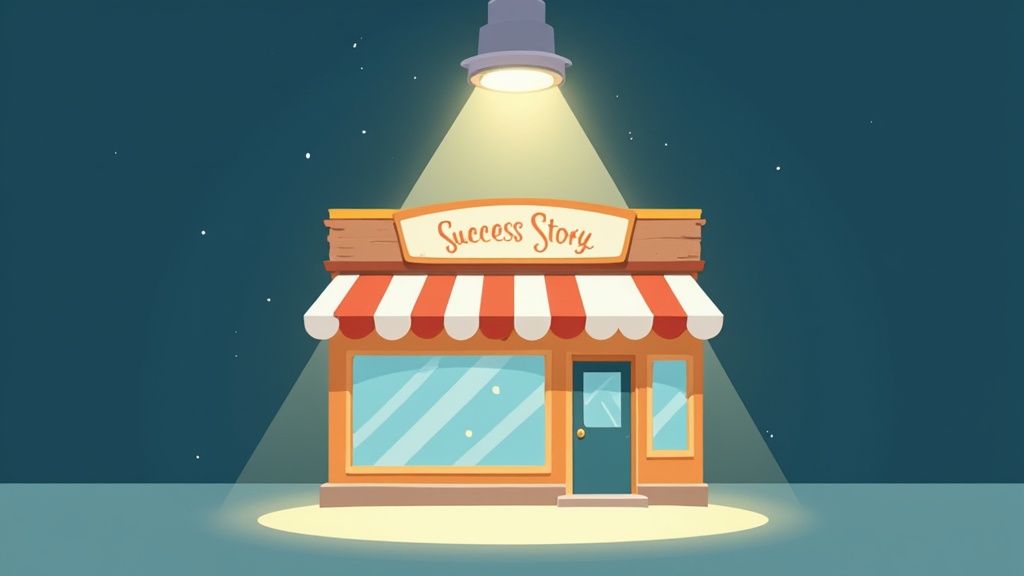
Let's be clear: hiring an ecommerce consultant is an investment, not an expense. And like any smart investment, you need to know exactly how to measure its return. This means looking past surface-level vanity metrics and getting laser-focused on the key performance indicators (KPIs) that actually move the needle for your business.
True accountability starts with setting clear, measurable goals before the work even begins. This is the only real way to know if your investment in a consultant is delivering tangible, bottom-line growth. Without a baseline, you're just flying blind.
Defining Your Key Performance Indicators
Before a consultant touches a single line of code or writes a single piece of ad copy, you have to know your numbers. These core metrics will be the yardstick against which every strategy and recommendation is measured. We're not talking about how many new followers you get; we're talking about the financial health of your business.
Your focus should zero in on the numbers that truly matter:
- Customer Acquisition Cost (CAC): How much does it cost you, on average, to bring in a new customer? A good consultant’s strategies should drive this number down.
- Customer Lifetime Value (CLV): What’s the total revenue you can realistically expect from a single customer over their entire relationship with your brand? Effective consulting should make this number grow.
- Conversion Rate: What percentage of your website visitors actually complete a purchase? This is one of the most direct measures of how well your site is working.
- Average Order Value (AOV): How much does the average customer spend each time they buy from you? A higher AOV means more revenue from the same amount of traffic.
Establishing these baselines is non-negotiable. For instance, if your current conversion rate is 1.5% and your AOV is $75, you now have concrete benchmarks. The entire point of the consulting engagement is to systematically improve these figures.
Attributing Success to Specific Strategies
Once the project kicks off, the focus shifts to attribution. A skilled consultant will use analytics to connect their actions directly to your results. If they overhaul your email marketing flow, you should see a clear lift in your repeat purchase rate. If they optimize your product pages, you should be able to track the conversion rate for those specific pages.
A successful consulting engagement isn’t a mystery. It’s a clear cause-and-effect relationship where a strategic action leads to a measurable, positive business outcome. You should be able to draw a direct line from their advice to your improved KPIs.
This data-driven approach removes all the guesswork and gives you the power to hold your partner accountable. The global e-commerce market is projected to hit $8.3 trillion in 2025, a massive 55.3% jump from 2021. With accountability being so crucial, you need an expert who can deliver provable results.
Ultimately, measuring your return is about tracking both efficiency and growth. A consultant might help you get more out of your ad spend, which is why understanding effective strategies to improve marketing ROI is so important. By improving your core metrics, a consultant doesn't just generate a few extra sales; they build a more profitable and sustainable business for the long haul. For more ideas, you can check out our guide on how to improve ecommerce sales with actionable tactics.
Dipping your toes into the world of ecommerce consulting services can feel a bit like planning a major trip. You've heard amazing things and know it's full of potential, but you've got some practical questions before you pack your bags. Let’s clear up some of the most common questions business owners have so you can move forward with total confidence.
How Much Do Ecommerce Consulting Services Cost?
This is always the first question, and for good reason. The honest answer is: it really depends. It's a lot like buying a car—a reliable family sedan has a very different sticker price than a custom-tuned sports car. The cost of a consultant is shaped by the project's scope, their level of experience, and how they structure their pricing.
Generally, you'll run into a few common models:
- Hourly Rates: Simple and direct. You pay for the time they spend working for you. Rates can swing from $100 to over $300 per hour, based on their track record and expertise. This works great for smaller, well-defined tasks or when you just need an expert on call.
- Project-Based Fees: For projects with a clear beginning and end—like a deep-dive website audit or a complete conversion rate optimization plan—a fixed price is common. This could be $2,000 for a straightforward audit to $10,000 or more for a full-blown strategic plan. The big win here is that you know the exact cost upfront.
- Monthly Retainers: When you need ongoing strategic partnership, a monthly retainer is the way to go. This can range from $2,000 to well over $20,000 a month. This model essentially brings the consultant into your team as a long-term strategic guide who's deeply invested in your growth.
- Performance-Based Models: A more modern approach is tying payment to actual results. For instance, a consultant might take a percentage of the revenue increase they help create. This perfectly aligns their goals with yours, creating a powerful partnership focused on real, measurable wins.
Always, always ask for a detailed proposal before you commit to anything. It should lay out every cost, deliverable, and timeline in plain English. No surprises.
When Is the Right Time to Hire an Ecommerce Consultant?
The best time to bring in a consultant isn't just when the wheels are falling off. It's when you're ready to make things go from good to unstoppable. Too many brands wait until they’re in a tough spot, but the smartest ones hire consultants to build a serious competitive advantage and accelerate their growth.
You should seriously consider hiring a consultant if you're nodding along to any of these:
- You're Stuck on a Problem Your Team Can't Crack: This is the classic trigger. Sales have flatlined, conversion rates won't budge no matter what you try, or you're fighting a technical beast that's way outside your team’s wheelhouse.
- You're Gearing Up for Major Growth: Things are good, but you want them to be great. Maybe you're eyeing a new market, launching a flagship product line, or you just want to scale faster than everyone else. A consultant brings the strategic firepower to make that happen.
- Your Own Growth Is Causing Chaos: Ironically, sometimes success is the problem. Your inventory is a mess, fulfillment is a nightmare, and your customer service team is completely swamped. A consultant helps build the solid systems and processes you need to scale without breaking.
- You're Facing a Big Technology Decision: Picking a new ecommerce platform or overhauling your tech stack is a huge, costly move. An expert provides unbiased, experienced advice to make sure you're making a smart investment for the long haul.
Can a Small Business or Startup Afford a Consultant?
Yes, absolutely. In fact, for a small business or a startup, a consultant can be one of the highest-leverage investments you make. It’s all about getting access to top-tier expertise you couldn't possibly afford to hire full-time.
Think of it this way: hiring an experienced Chief Marketing Officer or a Head of Ecommerce comes with a six-figure salary, plus benefits. A consultant gives you that same brainpower and strategic insight for a fraction of the price, right when you need it.
For a startup, a consultant is a lifesaver for building a strong foundation. They'll help you sidestep those classic, expensive "rookie mistakes" with your platform choice, marketing setup, and initial strategy. That early guidance can save you tens of thousands of dollars and months of lost time.
For a small business, a consultant is your secret weapon against bigger competitors. They can map out a lean, high-impact growth plan that makes sure every dollar of your limited budget is spent on what will actually move the needle.
What Is the Difference Between a Consultant and an Agency?
This is a fantastic and critical question. Their work can sometimes look similar, but their core purpose is totally different. The easiest way to think about it is strategy versus execution.
An ecommerce consultant is the architect who designs the blueprint for your entire business. A marketing agency is the construction crew that builds it.
An ecommerce consultant takes a holistic, 30,000-foot view of your whole operation. They’re like a business doctor. They dig into your marketing, tech, logistics, customer service—everything—to diagnose the root problems and create a high-level strategic roadmap for growth. In short, a consultant tells you what to do and why.
A digital marketing agency, on the other hand, is a team of specialists focused on the how. They are the doers. You hire an agency to run your Google Ads, manage your social media, or write your SEO content. They're experts at executing the plan. Often, a consultant will actually recommend hiring a specific type of agency to help bring their strategic vision to life.
Ready to stop guessing and start growing with a clear, data-driven strategy? At ECORN, we combine deep Shopify expertise with proven ecommerce consulting to help brands like yours scale efficiently. Whether you need a full strategic overhaul or targeted help with conversion rates, our team is here to build your path to success. Discover our flexible ecommerce consulting packages today.






